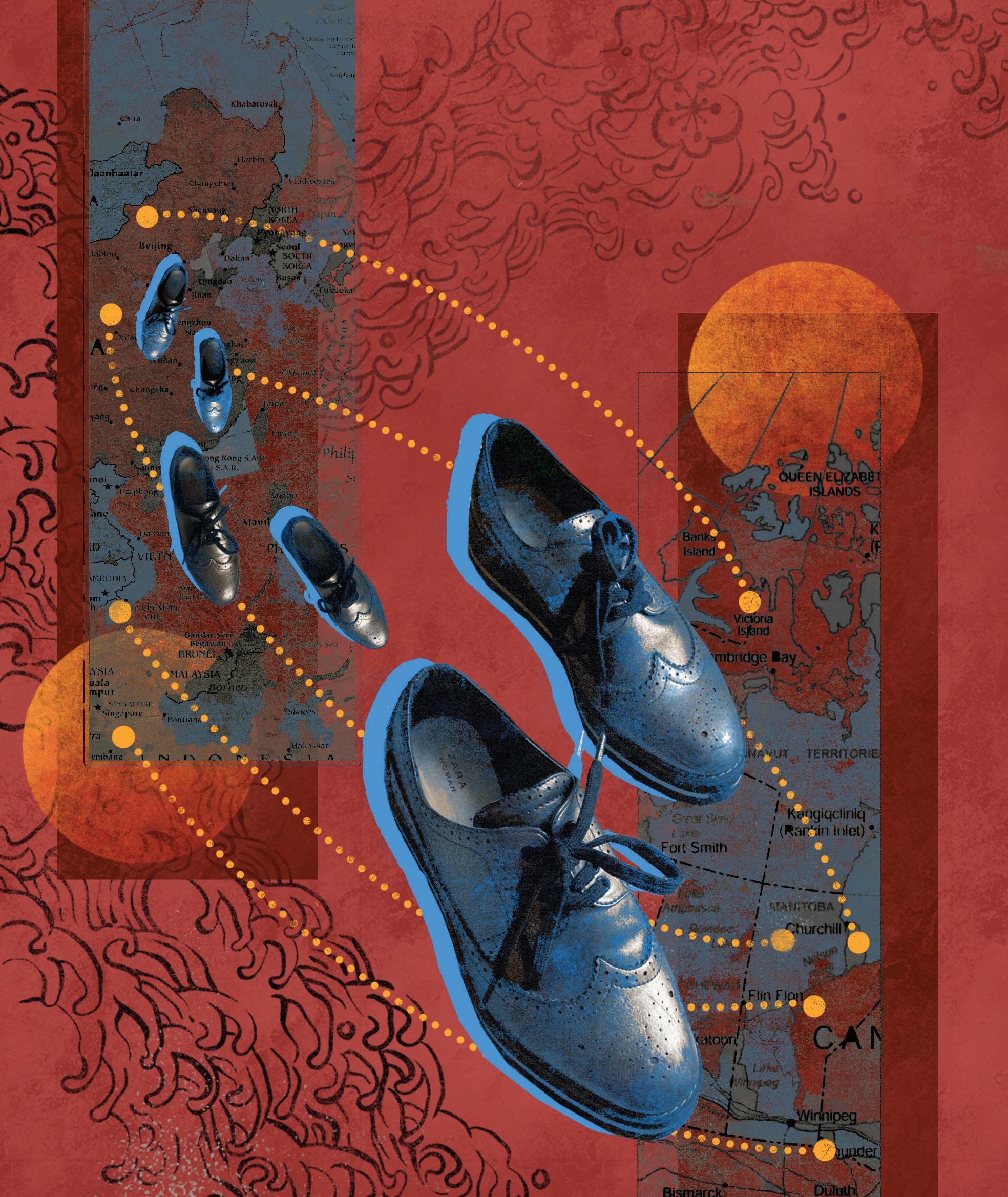
03 NEWS U THE UBYSSEY MAY 30, 2023 | VOLUME CV | ISSUE I PANTSLESS SINCE 1918 Graduate research assistants eligible to unionize 13 11 12 SCIENCE Undergrad UBC students map BC sex ed BLOG How to be late to your 8 a.m. class SPORTS Spring Thunderbird updates 05 CULTURE Luka Kawabata is revitalizing classical music ‘A STORY ABOUT US’: UBC ACAM PROGRAM BUILDS ON THE HISTORY OF VANCOUVER’S ASIAN DIASPORA // 8–9
EDITORIAL BUSINESS
Coordinating Editor Anabella McElroy coordinating@ubyssey.ca
News Editor Aisha Chaudhry news@ubyssey.ca
News Producer Renée Rochefort news@ubyssey.ca
Culture Editor Elena Massing culture@ubyssey.ca
Features Editor Iman Janmohamed features@ubyssey.ca
Opinion Editor Spencer Izen opinion@ubyssey.ca
Blog Editor Jocelyn Baker blog@ubyssey.ca
Science Editor Tova Gaster science@ubyssey.ca
Sports + Rec Editor Lauren Kasowski sports@ubyssey.ca
Visuals Editor Anya A Ameen visuals@ubyssey.ca
Photo Editor Isa S. You photo@ubyssey.ca
Video Producer Ravnoop Badesha video@ubyssey.ca
Lauren Tjoe is working with dough in and out of the kitchen
Business Manager Douglas Baird business@ubyssey.ca
Account Manager Forest Scarrwener advertising@ubyssey.ca
Web Developer Brittany Sampson b.sampson@ubyssey.ca
Web Developer Sam Low samuellow@ubyssey.ca
Web Developer Akshanjay Kompelli akshanjaykompelli@ubyssey.ca
Social Media Manager [Vacant] social@ubyssey.ca
President Jalen Bachra president@ubyssey.ca
CONTACT
Editorial Office: NEST 2208 604.283.2023
Business Office: NEST 2209 604.283.2024
6133 University Blvd. Vancouver, BC V6T 1Z1
Website: ubyssey.ca
Twitter: @ubyssey
Instagram: @ubyssey
Facebook: @ubyssey
TikTok: @ubyssey
Bridget Stringer-Holden Contributor
The night before the start of the Great Canadian Baking Show (GCBS), Lauren Tjoe sat terrified in her hotel room. Not only is she allergic to gluten and dairy, but she was the youngest baker in her season by nine years.
“I got there and I was so scared,” said Tjoe, a fourth-year Sauder student. “Everyone had so many more life experiences than I had — so much more experience baking and being around food.”
It wasn’t just Tjoe’s inexperience that made her nervous. She put her life on hold for the show. She deferred a co-op opportunity to bake on Canada’s greatest stage.
bakes.
With carrot-shaped scones, feta-jalapeno tarts that resembled pea pods and faux tomatoes made out of Korean pancakes and eggplant stroopwafels, Tjoe’s veggie garden-themed centerpiece dazzled the judges.
With that, she won the sixth season of the GCBS.
“Up until they called my name, I didn’t think I was going to win, and I’m honestly still in shock — it still feels like a dream,” Tjoe said. “I was speechless because the other bakers in the tent [are] so talented.”
LAND ACKNOWLEDGEMENT
We wish to acknowledge that we work, learn and operate the paper upon the occupied, traditional, ancestral and unceded territory of the Coast Salish peoples, including the xʷməθkʷəyəm (Musqueam), Sḵwxwú7mesh (Squamish), Stó:lō and səli lwətaɁɬ/Selilwitulh (Tsleil-Waututh).
The Ubyssey is the official student newspaper of the University of British Columbia (UBC).
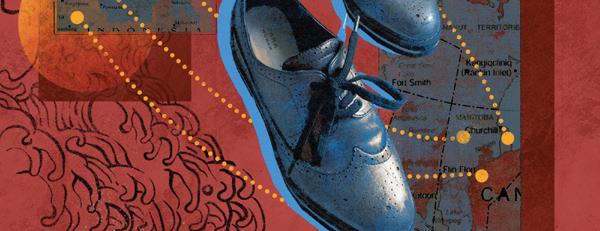
It is published every second Tuesday by the Ubyssey Publications Society (UPS). We are an autonomous, democratically-run student organization and all students are encouraged to participate. Editorials are written by The Ubyssey’s editorial board and they do not necessarily reflect the views of the UPS or UBC. All editorial content appearing in The Ubyssey is the property of the UPS. Stories, opinions, photographs and artwork contained herein cannot be reproduced without the expressed, written permission of the Ubyssey Publications Society.
The Ubyssey is a founding member of Canadian University Press (CUP) and adheres to CUP’s guiding principles.
The Ubyssey accepts opinion articles on any topic related to UBC and/or topics relevant to students attending UBC. Submissions must be written by UBC students, professors, alumni or those in a suitable position (as determined by the opinion editor) to speak on UBCrelated matters. Submissions must not contain
“At the beginning, [I thought] if I go out the first round, then that whole rigamarole of deferring, that’s going to be for nothing,” said Tjoe. “So I was putting a lot of pressure on myself.”
Emotions washed over Tjoe the moment she was announced the winner. She felt relief because the competition was over and she wouldn’t have to feel that stress again, but she said she’d never worked harder for anything in her life.
throughout our interview.
“They’re the most amazing friends, and we’re constantly inspiring each other,” she said. “Right now someone is looking for an appetizer to bring to a dinner party, so we’re throwing out ideas in the group chat — it’s pretty cool.”
Tjoe said baking has allowed her to explore flavours from her childhood and heritage as a Dutch, Chinese and Indonesian person. But moving forward, Tjoe doesn’t think the baking path is for her.
Instead, she plans to work in Toronto this summer at Canada Pension Plan Investments — the co-op she’d originally deferred — and plans to finish her degree this December to work in corporate finance.
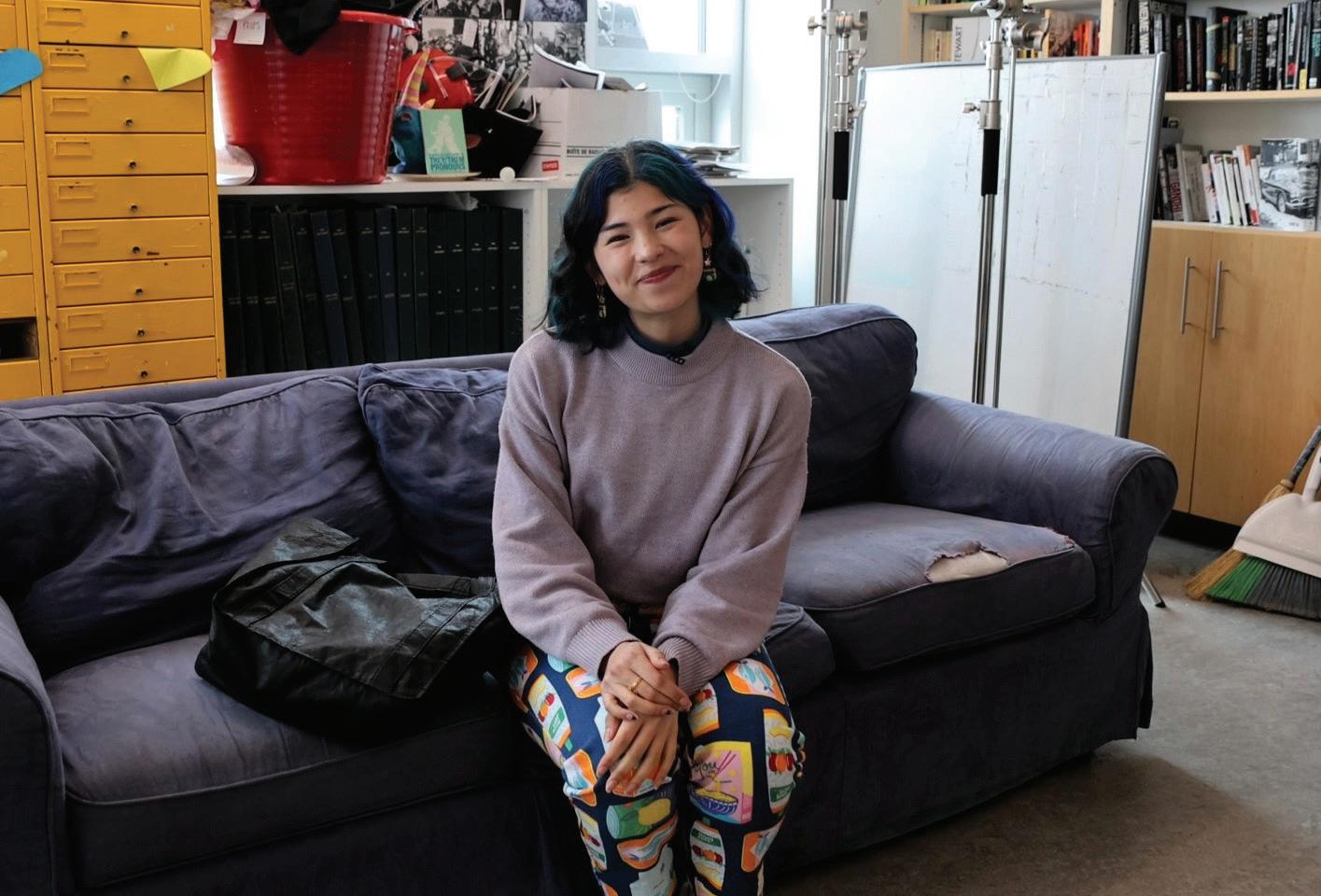
racism, sexism, homophobia, transphobia, harassment or discrimination. Authors and/ or submissions will not be precluded from publication based solely on association with particular ideologies or subject matter that some may find objectionable. Approval for publication is, however, dependent on the quality of the argument and The Ubyssey editorial board’s judgment of appropriate content. Submissions may be sent by email to opinion@ubyssey.ca
Please include your student number or other proof of identification. Anonymous submissions will be accepted on extremely rare occasions.
Requests for anonymity will be granted upon agreement from four-fifths of the editorial board.
Full opinions policy may be found at ubyssey.
ca/pages/submit-an-opinion
It is agreed by all persons placing display or classified advertising that if the UPS fails to publish an advertisement or if an error in the ad occurs the liability of the UPS will not be greater than the price paid for the ad. The UPS shall not be responsible for slight changes or typographical errors that do not lessen the value or the impact of the ads.
Tjoe said she applied for the show twice before getting cast. The first time, she applied a bit late and didn’t think her application went through.
“Even if it had, I wouldn’t have been ready. I was still in the phase of having to follow recipes really carefully and not knowing how to make them my own,” she said.
The second time Tjoe applied to the show, she made it to the audition stage but wasn’t cast.
But the third time felt different.
“I felt super confident in my baking and felt like if there was going to be a time when I went on the show, it would have been now or never,” said Tjoe.
After working year after year to get on the show, winning was all the more sweet for Tjoe.
Tjoe rolled into the final challenge of the season with a fresh win under her belt from the same episode. She was tasked with creating a garden party dessert centrepiece made from at least three different
“I can’t compute how I did everything I did in the amount of time that was allocated. I think if I tried to do that now, I am so out of practice doing things to time, it just doesn’t seem possible,” she said.
Tjoe found the GCBS a space where she was able to become “a completely different baker” because of the knowledge others shared with her. “I got such great feedback [from other contestants],” said Tjoe.
Since Tjoe is allergic to gluten and dairy, she often can’t taste what she bakes. Instead, she goes off her intuition, flavour combinations she knows work well, the smell and consistency of her creations and feedback from others.
“The ability to have people who knew what they were talking about give me feedback about my food, rather than my family just being like ‘Oh yeah, this is good,’ was I think the biggest help.”
This sense of camaraderie didn’t end in the kitchen, it extended into an ever-active group chat, with Tjoe’s phone buzzing with messages from former contestants
“Keeping my hobbies separate from my work is something that I find very valuable. Each one is a good break from the other one,” she said. “This sounds so dumb, but I really enjoy corporate finance ... I like working with numbers, and finance as a career gives me that. Then, I can go home and bake a bunch of pies … [but] my livelihood doesn’t depend on how many pies I bake that night.”
Despite Tjoe’s baking success, she said there is still much to learn. She wants to learn how to use — and keep alive — sourdough starter. “I don’t have the discipline to keep a starter alive,” said Tjoe. “I had two this term and they both died.”
But, just like many other university students, she’s just figuring it out and practicing as much as she can. That’s also her advice for anyone who wants to get into baking.
“Practice as much as you possibly can because there’s never a point where you’re going to be perfect at anything,” said Tjoe. “No matter what’s thrown at you, you’ll be able to replicate something or you’ll have a bank of knowledge to draw from.” U
ON THE COVER COVER ANYA ANBE R AMEEN WHO’S WHO AT UBC PAGE 2 2 MAY 30, 2023 TUESDAY
ULEGAL MAY 30, 2023 | VOLUME CV | ISSUE THE UBYSSEY OUR CAMPUS
ISA S. YOU / THE UBYSSEY
Tjoe is the season six winner of the Great Canadian Baking Show.
Decoding UBC’s international major entrance scholarship
Himanaya Bajaj Senior Staff Writer
Every year, UBC offers meritbased scholarships to international students based on their academic achievement and extracurricular involvement.
The scholarships can be classified into the Outstanding International Student Scholarship (OIS) and the International Major Entrance Scholarship (IMES). While the OIS is a one-time scholarship offered to incoming first-year students, the IMES can be renewed for up to three years. IMES is offered to students who display exceptional community and extracurricular involvement along with academic achievement.
The selection criterion for the IMES was determined when at its creation by the Senate and is tied to the admissions decision.
“When students are admitted and after we see a solid pool [of admitted students], then about three weeks thereafter, a decision is made on whether they’re at the top of their group,” said Damara Klaassen, the International Student Initiative’s executive director.
Klaassen explained there is no other criterion used to determine the award recipients.
“There’s no weighting beyond what happens as part of the admissions consideration in general.
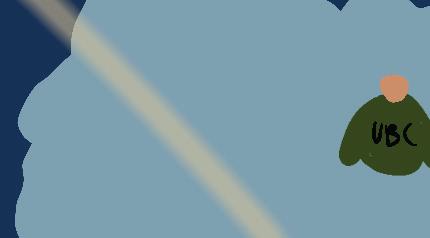
So, those reviewing the files for awards do not go into any more detail beyond what is reviewed for admissions,” she added.
To maintain scholarships, students need to meet certain criteria like being registered in 24 credits, passing all courses and obtaining a standing in the top 10 per cent of their year and faculty or an average of 75 per cent or higher.
For the year 2022/23, 99 new IMES scholars joined the UBC Vancouver campus. For the
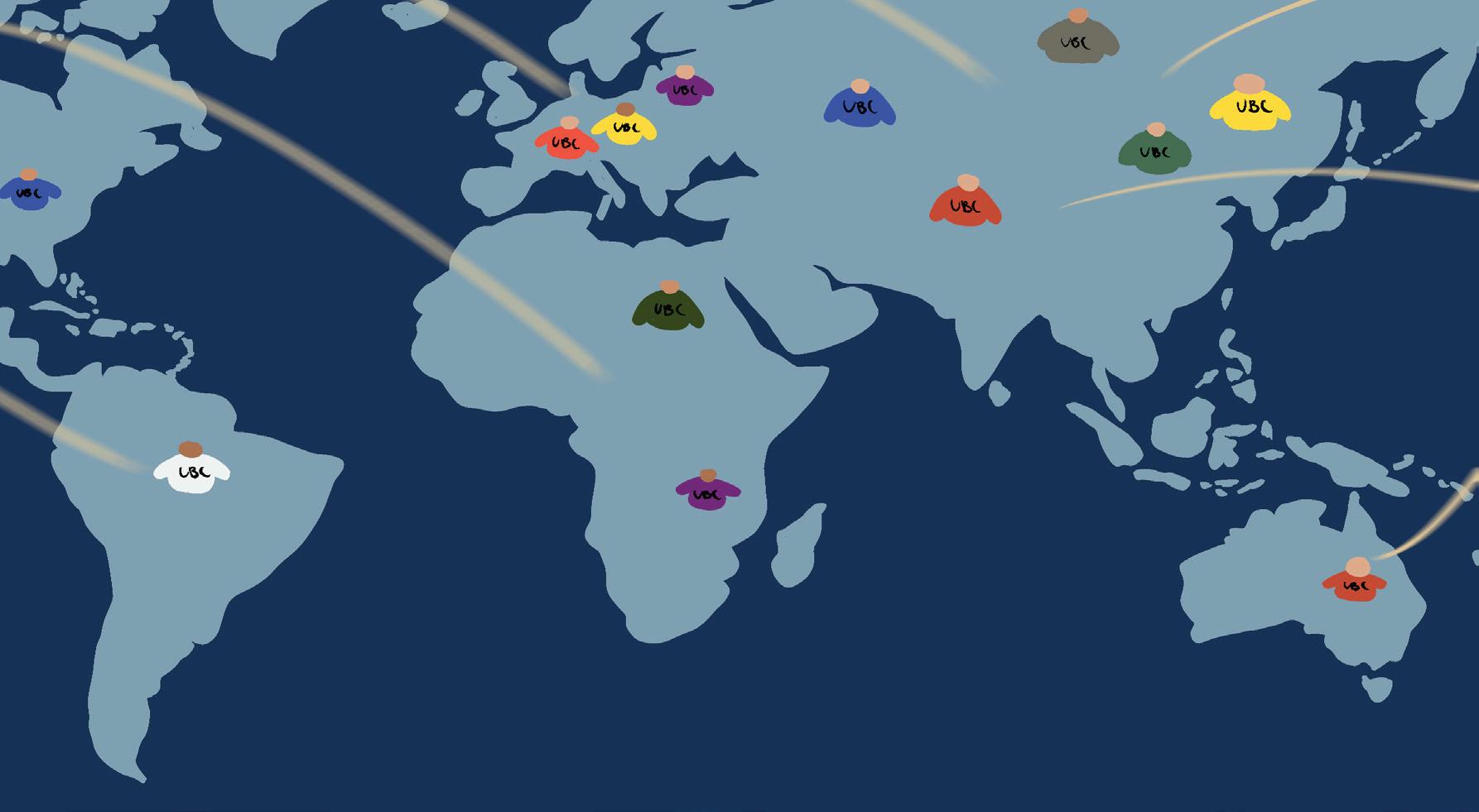
upcoming 2023/24 year, UBC is hoping to admit 125 IMES scholars, but the number will depend on how many recipients accept their offer.
“The year one funding [per student[ is $20,000 so the budget last year...was around $2 million, and this year we’re hoping [for] 125 [IMES scholars],” said Klaassen. “If we can get there, then that would be a first year budget of $2.5 [million], and then we have a continuing cohort on the Vancouver campus [consisting of] a little bit over 400 students. So
then that’s a much larger budget.”
UBC aims to be proportionate across degree programs in awarding the IMES to ensure that the funding is spread across various programs and students. However, the country of origin is not considered when awarding these scholarships because it is not a factor in the admission criteria.
According to Klaassen, the motive behind awarding these scholarships was to admit top students from various countries. U
RAs eligible for automatic union certification
“It is our position that under the B.C. Labour Relations Code the students in question are students, pursuing academic and scholarly activity toward their respective degrees, not employees,” wrote Matthew Ramsey, director of university affairs at UBC Media Relations, in a statement to The Ubyssey
“As such, the monies they receive are scholarship awards and are treated as such … and do not constitute wages received for work performed,” he continued.
A lawyer representing CUPE 2278 told The Tyee that UBC’s position contradicts precedent set in other provinces.
UBC is also objecting on the grounds that many RA contracts expired at the end of April.
Aisha Chaudhry News Editor
AMS Council defers sexual violence policy review
April 29 — At the final meeting for the 2022/23 AMS Council, the approval of revisions to the society’s respectful workplace and sexualized violence policies (PC1 and PC2) were deferred to the incoming 2023/24 Council. The deferral occurred because of student criticism raised during the meeting, where many students voiced concerns about the revised policies not properly incorporating feedback from the Sexual Assault Support Centre (SASC) and bringing more barriers to reporting sexual assault.
AMS Council dissolves ad-hoc Governance Review
May 6 — AMS Council met for the first time with the new executives and councilors. Council dissolved the Ad-Hoc Governance Review Committee, which was created to review Council and create an annual report about recommendations for the AMS. The Governance Review Committee will be taking over the tasks. Arts Councillor Anna Shubina was also appointed to the Board of Directors for CiTR.
AMS Council fills committees for the year
May 19 — Council filled all committees, except for one, with the necessary councilors and student-at-large members. No councilor was appointed to the Student Legal Fund Society board, and the decision was postponed until the next meeting.
Senate report recommends external review
May 19 — At the last Senate meeting of the year, the Nominating Committee shared their end of triennium report, which recommended an external review and further training for Senators. An external review has not been done since 2005.
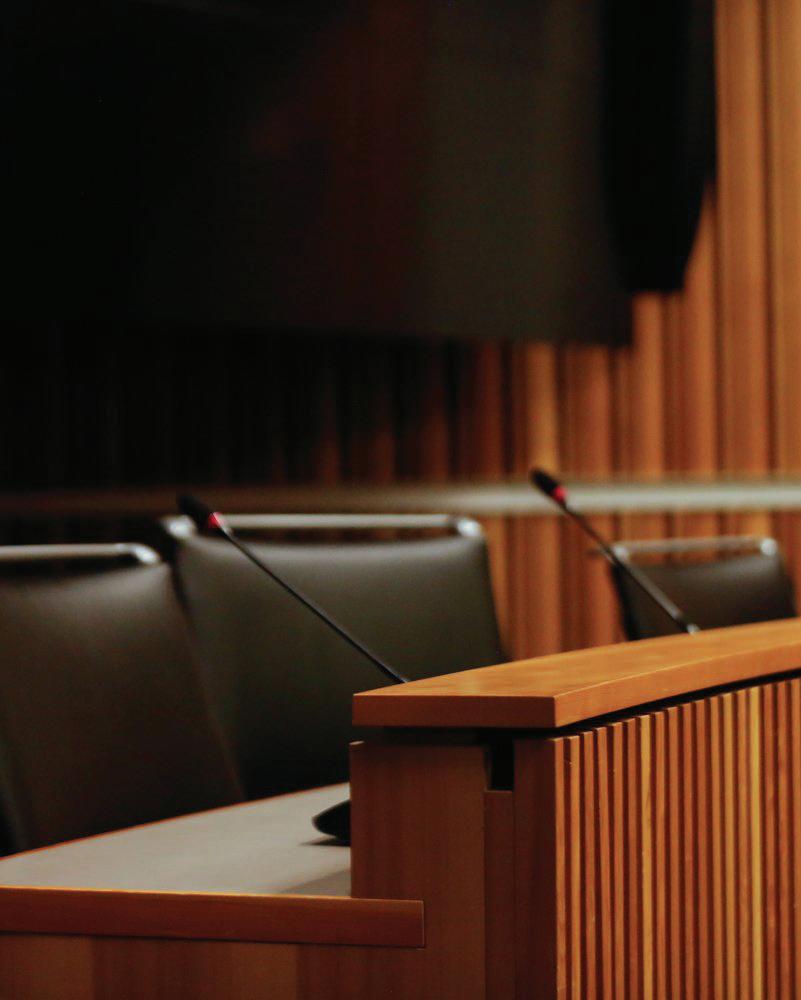 Anabella McElroy Coordinating Editor
Anabella McElroy Coordinating Editor
The BC Labour Relations Board has ruled enough graduate research assistants (RAs) have signed union cards to join CUPE 2278 without a vote, according to the union.
The union certification will not be immediate, as UBC has challenged RA’s status as employees to the labour board.
CUPE 2278, the union that currently represents teaching assistants at UBC, launched the union drive in September 2022 with the intention of including all student academic workers in the local chapter. The current
certification application, filed on April 28, only includes graduate research assistants — around 3,200 people.
In BC, groups that get 45 to 55 per cent of eligible union members to sign a membership card must conduct a vote to certify themselves as a union. If 55 per cent of eligible members sign though, the union is automatically certified.
The LRB was not able to determine if threshold for automatic certification had been reached within five days of CUPE’s application. As such, a verification vote for RAs was called by the labour board, which ran from
Monday May 8th to Wednesday May 10th.
CUPE 2278 President Emily Cadger said the union was informed by the labour board on Thursday that organizers had actually reached 55 per cent.
The union informed supporters of the campaign of the news, but objections from UBC have stopped the union from certifying.

As first reported in The Tyee, UBC is challenging the certification on two grounds. First, it is arguing that RAs are not employees, but rather receiving scholarship money for their academic work.
It will be up to the labour board to decide whether either of these factors prevent RAs from unionizing. After an initial hearing earlier, further hearings are scheduled for June and July.
Liz Locke, a CUPE national organizer, told The Ubyssey that if UBC’s objections are overturned by the board or withdrawn, the ballots from this week’s vote will likely be destroyed following automatic union certification.
Cadger said the speed at which the organizers were able to file for union certification showed a desire among research assistants to unionize.
“I think it’s really important to underscore how fast and how great this has been, which speaks to the demand that the unionization campaign is really wanted by the people who signed cards.” U
Senators also passed four new degrees for the coming years. This includes a PhD in design, technology and society, a post-baccalaureate certificate in mechanical engineering, a graduate certificate in applied geological engineering and an undergraduate certificate in data and models in political science. U
EDITORS AISHA CHAUDHRY + RENÉE ROCHEFORT NEWS MAY 30, 2023 TUESDAY 3 INTERNATIONAL AWARDS //
The motive behind awarding these scholarships was to admit top students from various countries. ARIEL QI / THE UBYSSEY
LABOUR RELATIONS //
Organizers hung a banner outside the Nest during fall 2022 as part of the union drive.
ANABELLA MCELROY / THE UBYSSEY
NEWS RECAPS ISABELLA FALSETTI / THE UBYSSEY
UBC T2SGD Task Force releases key recommendations
Bea Lehmann Senior Staff Writer
The Trans, Two-Spirit and Gender Diversity (T2SGD) Task Force has released their final report addressing gender inclusivity at UBC.
The task force was formed in March 2020 to create actionable recommendations for UBC leadership on gender identity, gender expression and human rights.
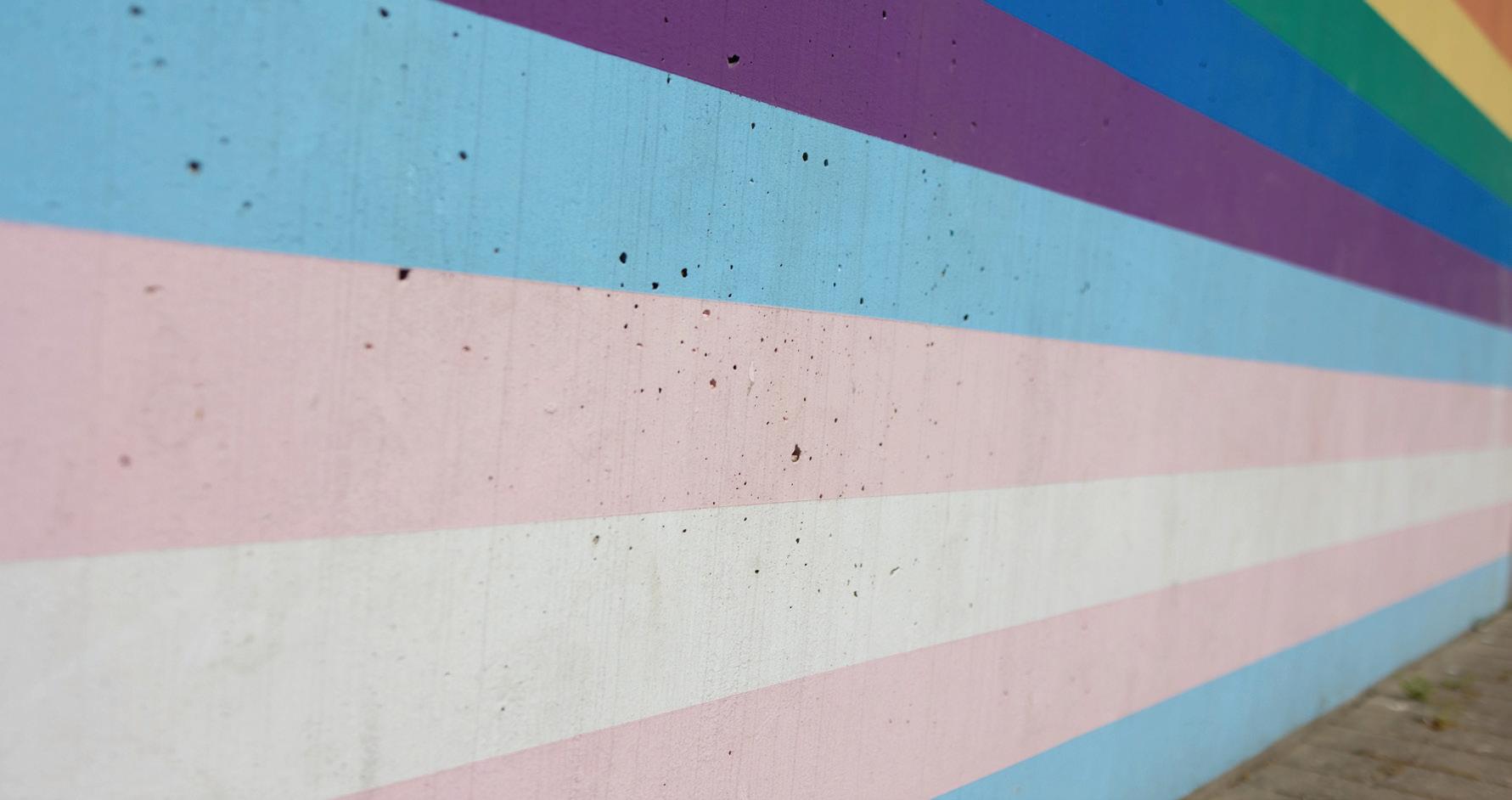
The report highlighted four key reccomendations, focusing on training and education, recruitment of T2SGD staff, gender data standards and T2SGD mental and holistic wellbeing.
“There’s been calls from the Transgender and non-binary communities at UBC for a long time to see themselves better integrated and better involved in the … processes of the university,” said task force member and report co-author Dr. Hélène Frohard-Dourlent.
One of the report’s key recommendations is attracting and retaining T2SGD staff. The report recommends UBC job postings include explicit language encouraging those with intersectional identities to apply for positions, and consider lived experience an asset of applicants.
Another recommendation encourages expanding the education available around gender diversity, and creating incentives to complete training. For example,
CUPE 2278 //
creating a badge system to allow community members to see what faculty and staff have completed additional courses on gender and sexuality.
Frohard-Dourlent said “marginalized students in general end up having to do quite a bit of [teaching] ... a great way to work in solidarity with people who are marginalized is to make yourself aware enough of these issues [so] that you can take on the education when you see other people making mistakes.”
For students in leadership
positions on campus, Frohard-Dourlent said taking the time to educate around “blind spots” is important, and ensuring that events are inclusive can make a huge difference.
“When you don’t have to face some of the barriers that [T2SGD] people face, you might not even realize [them],” they explained.
For example, Frohard-Dourlent mentioned that some T2SGD people’s legal names do not match their chosen names.
UBC still uses legal names for transcripts, residence contracts,
and other official letters such as student loans.
In the report, the task force recommended that “legal first names be removed as the default first name used in information systems and correspondence.”
Frohard-Dourlent also referenced far-right events hosted on the UBC campus in 2019. One critiqued event was an anti-Sexual Orientation and Gender Identity talk in 2019 that resulted in UBC being banned from Vancouver’s Pride parade that year.
“Folks in our in transgender
and non-binary communities felt unsafe on our campus and felt like UBC wasn’t providing a safe working and learning environment … there was a lot of repair that needed to be done with the community,” said Frohard-Dourlent.
This sentiment was reflected in the report’s recommendations for supporting the health and mental wellbeing of T2SGD community members. It advised that “campus and community safety be assessed and considered before accepting event bookings not sponsored, hosted, or endorsed by UBC and that the primacy of the University’s commitments to human rights be clarified in the new Academic Freedom policy.”
Frohard-Dourlent noted the task force’s diversity in terms of both personal identity and positionality on campus.
“We saw an opportunity at the Equity and Inclusion office with some key leaders and translators on campus to bring together this taskforce … [We] recognized the necessity of having people with lived experience contribute [to the task force].”
Going forward, Frohard-Dourlent highlighted the importance of intersectionality.
“These recommendations … don’t stand alone. They intersect with issues that have been brought forward by other marginalized communities on campus.” U
How a grassroots movement may unionize graduate RAs
Ekatarina Gofsky Contributor
The Organize UBC movement is a student-led initiative to unionize student academic workers. 55 per cent of graduate research assistants (RAs) have signed union cards to join CUPE 2278, an initial show of support for the Organize movement.
In late April, CUPE 2278 filed a demand to the BC Labour Board to include graduate research assistants into their collective bargaining agreement — the arbitration of which is still ongoing.
HOW DID ORGANIZE UBC GET HERE?
Emily Cadger, the president of CUPE 2278, is leading the movement with the help of organizers Tina Rothchild, a PhD candidate in the chemistry department, Sam Connolly, a masters student in physics and medicine and Tatiana Lau, a firstyear PhD student in microbiology and immunology.
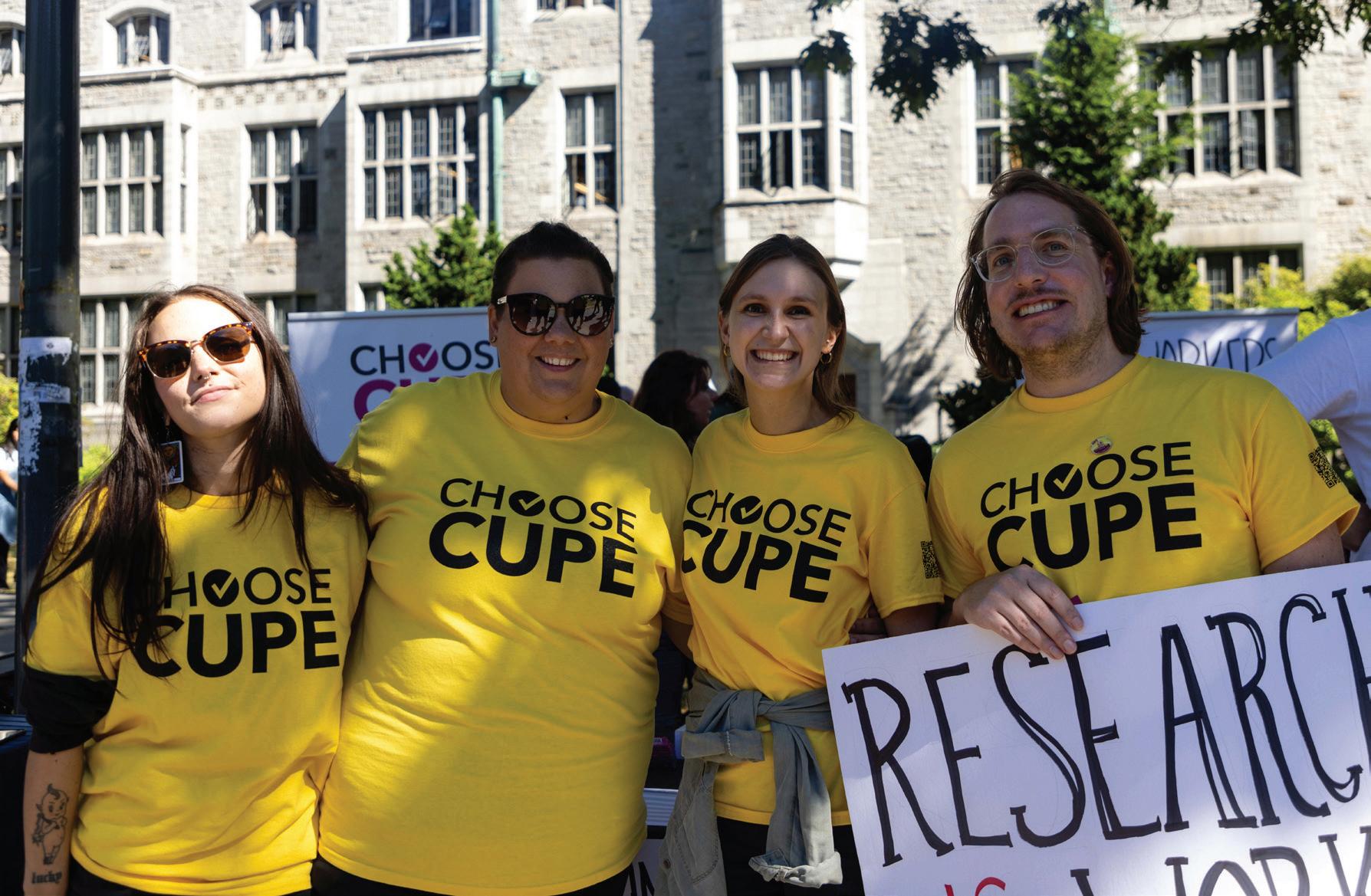
Since September 2022, organizers and supporters have worked within their faculties and departments to discuss common concerns and the potential benefits of unionization.
In an interview with The Ubyssey, Cadger said the current campaign to include graduate
research assistants in CUPE 2278 is the start to the goal of complete student worker unionization.
“It made a lot of sense to start with the graduate research assistants. We knew where they were and we had the numbers and we knew a lot of what their issues are. We are starting with them and we are building up so we eventually get all of the student
workers on campus [unionized]” said Cadger.
The call to unionize comes after concerns over the quality of life of graduate research assistants and their ability to produce meaningful research.
Lau said a survey completed in the chemistry department between December 2022 and January 2023 highlighted financial
struggles shared by many graduate students.
“Realistically, housing prices are going up, food prices are going up but our stipends have remained stagnant for almost a decade,” added Connolly.
In a written statement shared with The Ubyssey, Matthew Ramsey, the director of university affairs at UBC Media Relations, said the university
objects to this union drive as it sees graduate research assistants as students and not employees.
“It is our position that under the B.C. Labour Relations Code the students in question are students, pursuing academic and scholarly activity toward their respective degrees, not employees,” said Ramsey.
Ramsey added that UBC has supported the efforts of “graduate and post-doc students to receive much needed federal funding for their scholarly activities.”
Unionizing efforts also focus on establishing stricter working hours guidelines, as RAs have few forms of recourse when working conditions are difficult.
“There is no HR department so there is no way to hold these people accountable. These are tenured professors who don’t have the ability to even be fired so they really wield that power over us,” said Rothchild. “Having a union would be able to hopefully protect us from this type of exploitation in the future.”
Rothchild noted RAs work to uphold the high-quality research that UBC is known for and contribute to UBC’s high position in global rankings.
“It’s hard to do high quality research when you have all these additional challenges. These are things that could potentially damage UBC’s prestige and reputation in the long run if they are not addressed.” U
4 | NEWS | TUESDAY MAY 30, 2023 SUPPORTING INCLUSIVITY //
The task force will guide UBC leadership in areas of gender identity, gender expression and human rights.
Graduate research assistants showing their support for CUPE 2278.
NATHAN BAWAAN / THE UBYSSEY
ISABELLA FALSETTI / THE UBYSSEY
Personal essay: An honest foundation
Abbie Lee Contributor
I’m sure so many of us went through the (jumpscare) 20122016 James Charles boxy eyebrow phase, with amber shimmer on the eyelids, knife-like eyeliner and bushy fake lashes.
To be fair, the look is still a hit today, but on a twelve-year old Korean-Canadian girl, it was unsettling.
I’ve always been a bit devious when it comes to getting what I want, especially when what I wanted was to feel grown up. I introduced my mom to the idea of allowing me to wear makeup for a Halloween costume when I was about 13. My friend and I were dressing up as a white and fallen angel. I needed to embody the black-winged angel, so thick, winged eyeliner was a necessity.
My mom thought it was just for the one occasion, but I slowly phased it into an everyday thing. Wearing eyeliner daily made that little girl feel so secure. Her eyes were larger, wider, even seductive. They were sassy, not to be messed with. People would say, “eyeliner on fleek,” and ask her how she got it to look so clean.
When I look back at the way I lobbed on thick layers of pigment, I remember the YouTube tutorials of mostly white women with eyes
NIGHT AT THE OPERA //
I wanted, explaining to me just how easy it was to look as flawless as them.
I never gravitated towards makeup tutorials with faces like mine — these videos were never popular, and even if they were popular, the comment sections were filled with languages I recognized but never understood.
Often in the successful Asian beauty tutorials, the women had undergone plastic surgery to replicate the features of white women. Plastic surgery is a rite of passage once you turn 18, which confuses me now and will confuse me forever.
In some ways, I’m glad my disconnect from my Korean heritage caused me to grow up in a culture that doesn’t hold such strict beauty standards. Western standards still have a problematic emphasis on which types of bodies and skin colours are deemed beautiful, but the harsher standards of East Asia would eat me alive, despite already being quite fair and skinny for my build.
Being called ‘white-washed’ was such a highly sought after compliment.
Your eyes are so pretty. You have big eyes for an Asian. Are you half?
If I looked “super Asian,” like I was straight out of a K-pop girl group or a K-drama, I was
treated like a child. The innocent, pure, clean, dewy, sweet, passive beauty. One that could be a perfect, easily manipulated girlfriend who won’t talk back. However, if I look “white-washed,” I’m hot. I’m strong. I’m mature.
For a long time, I wanted to look like my friend who dressed as the
white angel, the half white, half Japanese girl I met when I was 12. She had beautiful double eyelids with lush lashes, a petite body and a flat nose — what all my other friends used to consider the best of both worlds.
Today, I still can’t say that I’ve completely let go of these desires.
I want to look my age. I want to be okay with doing glamorous looks, while still being equally content without them. I want to embrace and enhance my features, not erase them. But how do I do that?
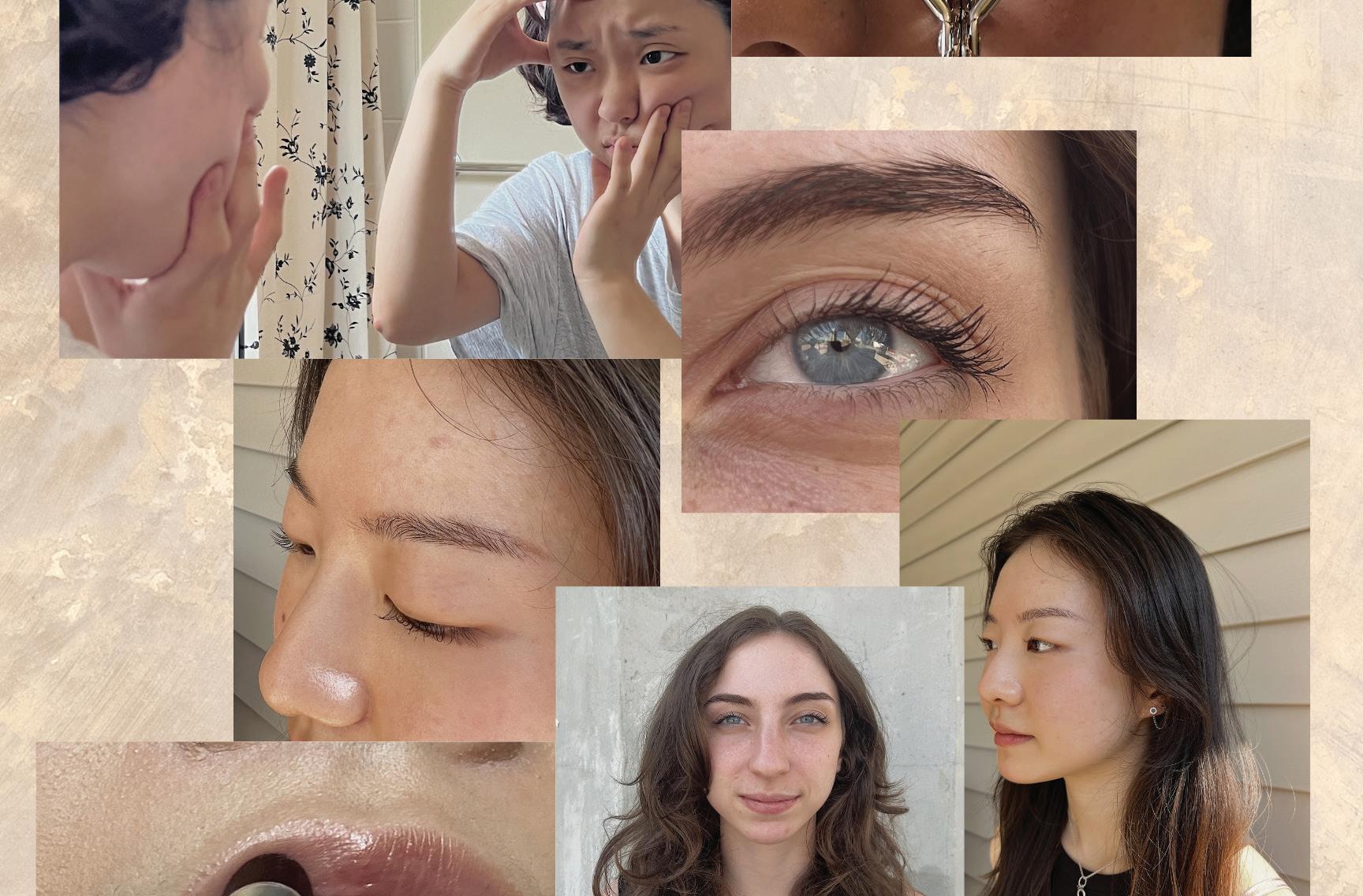
How do I build an honest foundation that doesn’t conceal who I am? U
Navigating Canada’s classical music scene with Luka Kawabata
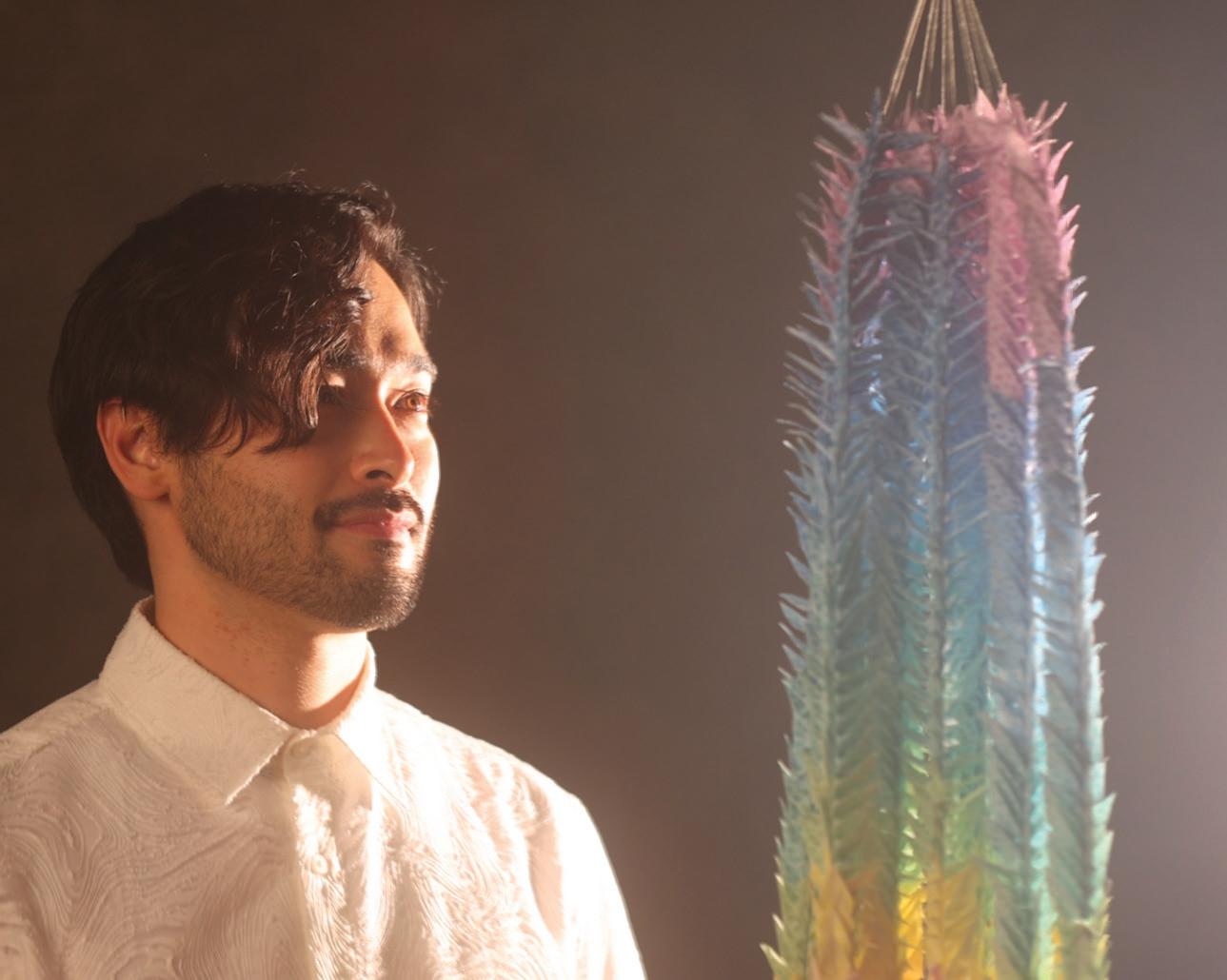
artists, but he found “an unspoken understanding that people share. I know that someone has probably gone through a similar experience if they are a Queer person, or a person of colour, in a performing arts circle.”
It is in these bonds that marginalized artists find the support they need to survive in an industry which Kawabata compares to a “rollercoaster, with big highs, big lows and everything in between.”
It is also where they draw inspiration to produce art reflecting these facets of their identity.
The Hafu Project (hafu refers to those who are ethnically half Japanese) is Kawabata’s most recent endeavour, influenced by these observations.
Elena Massing Culture Editor
Before doing both his bachelor’s and master’s in opera performance at UBC, Luka Kawabata studied engineering at Queen’s University.
It was not until after completing his engineering degree that he decided to pursue a music education, but once he made that choice, he never looked back. Since the end of his graduate program, he has become a well-known voice in the Canadian classical music scene, particularly through his work with the Vancouver Opera Young Artists Program. He has done very little engineering, but seems happy enough without it!
Though Kawabata has paved a way for himself in classical music,
receiving recognition is not common for Asian singers. The opera industry has not been kind to racialized performers, with very few gaining spots in major companies — Asian Opera Alliance’s breakdown of 2023-24 casting within United States opera companies illustrates just how drastic these deficits are.
“I’ve pointed out in very, very many rooms that I’m the only person of colour there,” said Kawabata.
“It’s a tricky place to be because I don’t want to analyze, necessarily, whether that’s coincidence or not, whether people are being conscious of whether they have a practice of diverse casting or diverse hiring.”
In the cases that he did find himself working with other marginalized
It is a three-part digital series exploring Kawabata’s own story as a Nikkei-Canadian navigating Canada’s classical music scene — an industry that is not exactly known for its history of diversity and inclusivity. A fusion of interviews, monologues and song, the project is Kawabata’s way of “bridging the gap between the classical music world that [he has] been a part of, and [his] identity as a racialized person in opera.”
The project observes how anti-Japanese sentiments are deeply entrenched in Vancouver’s history, particularly in the first part titled “Paueru-gai” (Powell Street), which features Kawabata wandering between the street’s landmarks, set to French art song.
“Childhood,” the second video of the series, explores how Kawabata’s parents approached raising multicultural children in Canada. It incorporates music in Japanese and Swedish, the two primary languages
of Kawabata’s heritage. All of the music in the upcoming third chapter will be in Japanese.
On this decision, Kawabata remarked that “without realizing it, each subsequent chapter of the Hafu Project ended up being my coming to terms with the fact that I could introduce Japanese music into the classical music community more actively.”
“It’s important for people to hear other languages in order for people to think that there’s a place for that language within the classical community,” he said.
He noted that his opera training did not formally emphasize non-Western languages, with the exception of some student-led projects. Without regularly hearing a language, it becomes far more difficult for people to “appreciate it as much, or be interested in pursuing study,” which is a huge motivator for Kawabata’s work.
The first two parts of the project, supported by mentors at the Banff Centre for Arts and Creativity, as well as the Manitoba Opera Digital Emerging Artists Program team, are available for anyone to view online, free of charge and with multilingual subtitles. This is a step towards increasing accessibility to an art form that is associated with, as Kawabata put it, “a sense of power in its elitism.” He pointed out that in order to promote the preservation and continuation of opera, we must question certain social and financial barriers.
In June 2023, Kawabata will release the final portion of The Hafu Project. Following a presentation at the Opera America conference this May, he hopes to continue to expand
the initiative, possibly through a stage adaptation or additional video chapters.
Though he has extensive performance experience, this is his first time taking complete hold of the creative reins as artistic director.
Not only is direction a skill set that Kawabata is just beginning to develop, but telling your own story is a vulnerable experience for any artist, regardless of how much experience they might have. This time around, he is not playing a character: he is simply himself.
Leaning into his individuality is the foundation of Kawabata’s creative work, even if this involves making mistakes, which is not typically encouraged in the rigorous training expected of opera performers.
“Many classical singers and musicians especially feel that they need to have their i’s dotted and their t’s crossed, and everything has to be in line… but being human is what creates connection,” he said.
Putting care into differentiating yourself from other performers is crucial. He said that taking risks to pick up new skills, and a dance class (a horrifying idea for an uncoordinated singer like myself), is worth the effort.
“Being a producer, being a performer, being a director, being a writer, being a dancer — I am not a dancer, I will also add, but I took a ballet class once — these are all going to support your art collectively. They are not competing with each other.”
“You can identify as multiple things and not feel like you are sacrificing your identity.” U
EDITOR ELENA MASSING CULTURE MAY 29, 2023 MONDAY 5 THE SKIN YOU’RE IN //
How do I build
ABBIE LEE
THE
an honest foundation that doesn’t conceal who I am?
/
UBYSSEY
“You can identify as multiple things and not feel like you are sacrificing your identity.”
COURTESY LUKA KAWABATA, PHOTO BY MARK YAMMINE
‘She will continue to inspire’: Deb Hope, Ubyssey alum and former Global BC journalist, dies at 67
Iman Janmohamed Features Editor
Besides her journalism skills and anchoring abilities, former Global BC anchor and reporter Deb Hope was known for her laugh — a sentiment that family, colleagues and fans recount when they think of her.
Global BC reported Hope died on May 15 at 67, after an 8 year fight against Alzheimer’s disease. She was married to Roger Hope, a Global BC cameraman and had two daughters and a step-daughter.
At 18, Hope moved from Trail, BC to Vancouver to attend UBC, and it was here the French major got a taste of journalism. She read newscasts for the community radio station, CiTR 101.9 FM, and reported for The Ubyssey where she covered everything from labour to tuition increases and housing.
After graduating from UBC, she attended Carleton University — where she studied journalism, leading her to stints at the Canadian Press and United Press Canada before settling in at Global BC in 1981, then known as BCTV.
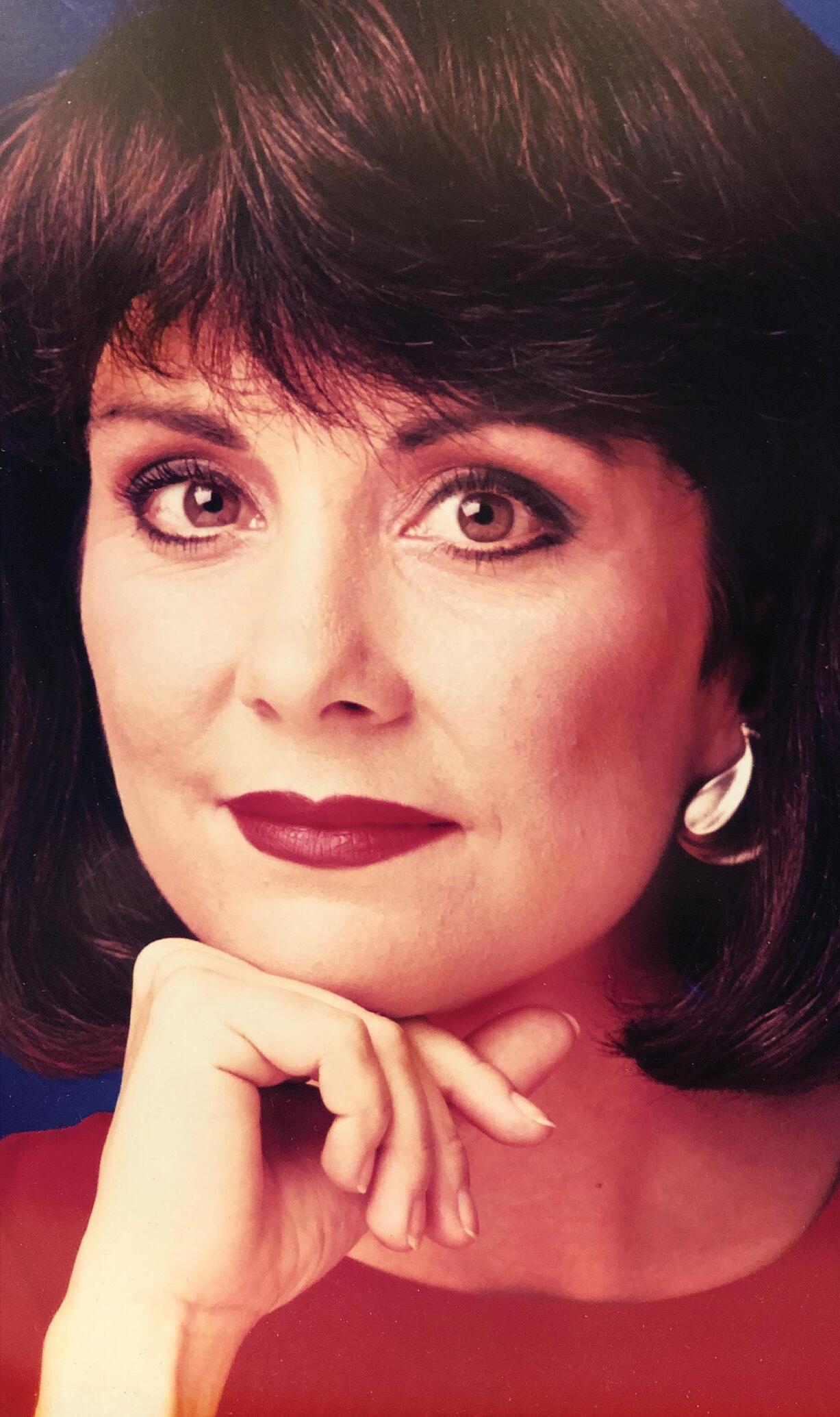
There, she hosted Noon News Hour, Early News and News Hour ‘InSight.’ Hope retired in 2014 after her Alzheimer’s diagnosis.
At Global BC, she worked closely with former News Director Ian Haysom.

“She was a fierce journalist, stood up for people’s rights, stood up for the little guy as well,” said Haysom. “Really, really cared about ordinary people.”
This showed in her mentorship to young journalists, Hayson said. “[Hope] really looked after the young reporters, the young writers [and] associate producers in the newsroom. She made everybody feel welcome.”
Haysom recounted an instance where she extended kindness toward a young reporter and Haysom’s son, Paul Haysom, who is now a Global BC anchor.
During his first week at Global BC, Paul wrote about whether or not something would happen at a council meeting.
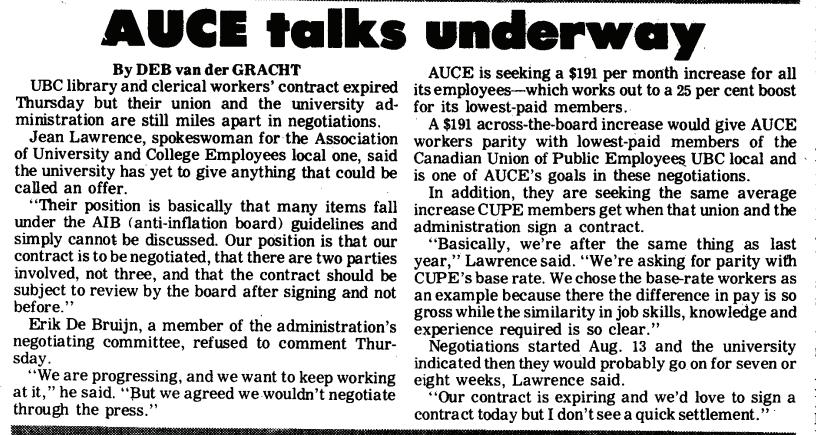
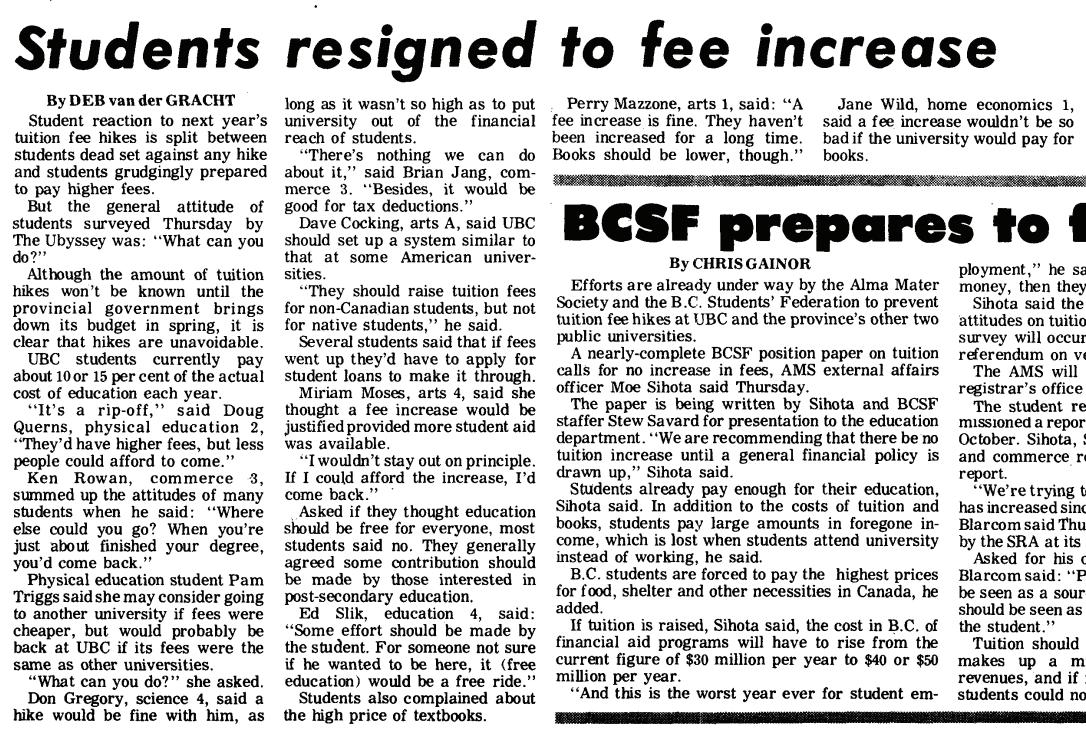
But, Paul spelled “whether” as “weather.”
Hope quietly changed it, leaving the script saying “Temperatures will be high at city council,” according to a tweet by Paul. Haysom said Paul was mortified once he realized his mistake, but Hope just laughed and thanked him for his “meteorological inspiration.”
“I loved your idea for a weather theme!” Paul recounted Hope saying.
This sense of humour made Hope a “focal point of the room.”
“She made the whole room comfortable
and laughter went a long way to [do] that,” said Haysom. “She could be mischievous and irreverent as well — she gave as good as she got.”
A FORCE TO BE RECKONED WITH
Once, BCTV, the Vancouver Sun and The Province met to play a soccer game and Hope was the only woman on the field. Haysom said that another reporter said that it was “cool” to see Hope play soccer with the other journalists.
But, after the game, the same reporter went to Haysom to say that Hope was “tough.” Haysom was confused until the reporter told him to look at his legs — bruised black and blue from Hope defending against him during the game.
This soccer field grit showed in the newsroom, too. Haysom said Hope asked tough questions and held power to account by putting it “through the meat grinder.”
But Hope’s questions weren’t always tough — she liked to playfully push Haysom’s buttons with them, too.
He said Hope would often march up to his office, put her hands on her hips and greet him — two different ways depending on how she was feeling that day. If she was happy with Haysom, she’d say “‘Hello, darlin’.’ Without the ‘g’ on the end,” he said. And if she were angry, she’d say “Okay, mister. What are we doing?”
Whenever Haysom was hit with an “Okay, mister,” he was sure to defend himself, saying he often got “into a pretzel” defending stories, but Hope would tell him that she liked what Haysom was doing, she was just curious — she wanted to know, she wanted to learn, she wanted to help.
“She could be funny,” said Haysom. “When she laughed she put her head back and just let it go. And sometimes let it go on air as well [and] would laugh and laugh and laugh. Sometimes too, she cried.”
In 2022, Hope was appointed a Member of the Order of Canada for her “contributions to Canadian journalism as a reporter and anchor, and for her tireless involvement as a volunteer.”
Her contributions to journalism were felt by Canadians, with many commemorating Hope’s career and life online after she passed away.
“Many people felt as though they knew her,” Haysom said. “Many broadcasters will make that kind of connection where people feel an affection and trust and connection to them … I’m not sure that is something we’ll see as much into the future.”
“She’s inspiring more and more people every day,” said Haysom. “And she will continue to inspire.” U
EDITOR IMAN JANMOHAMED FEATURES MAY 30, 2023 TUESDAY 6 OBITUARY //
From The Ubyssey ’s September 17, 1976 issue. UBYSSEY ARCHIVES From The Ubyssey ’s September 16, 1976 issue. UBYSSEY ARCHIVES From The Ubyssey ’s October 1, 1976 issue. UBYSSEY ARCHIVES
“She’s inspiring more and more people every day,” said Haysom. COURTESY
ROB HOPE
WHERE THE HEART IS
I TURNED 20 IN MY CHILDHOOD HOME IN GURGAON
words
and photos
by ANUSHKA BELLANI
It was the 22nd of December when the smoke-filled smog rushed into Indira Gandhi International Airport and I spotted my favourite people waiting to pick me up.
This was my first time home in six months, even though it felt like it had been so much longer. But, just like that (after a couple of long flights and a lost bag), I was back. As I left the airport, a break from a life of continuous introductions, finding better ways to get places and learning to live on my own started.
I grew up in Gurgaon, a city less than 30 kilometres from New Delhi known for housing corporate offices and a variety of renowned eateries but not much else.
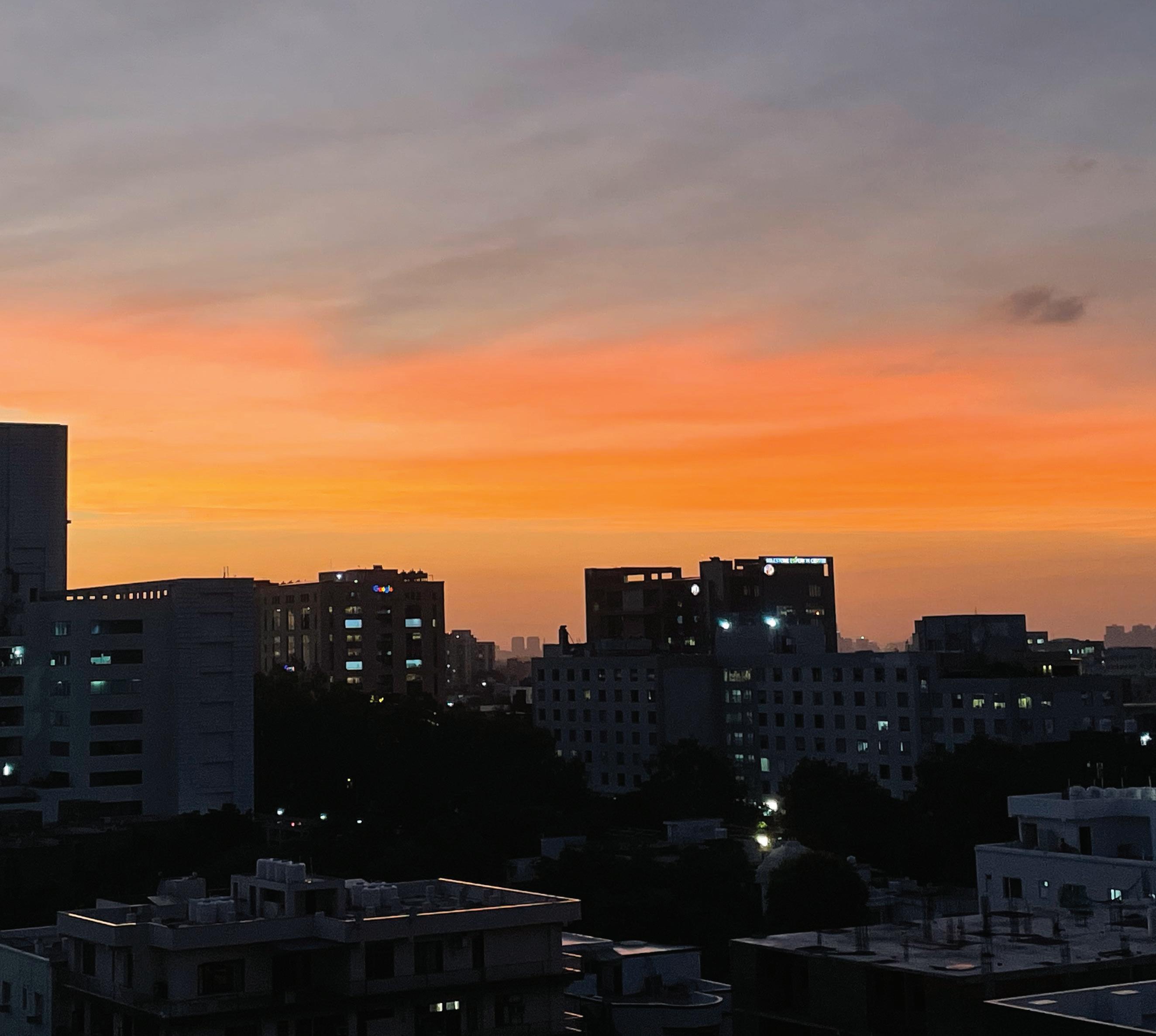
A few days ago, a friend asked me how many times I had moved growing up, I paused as though the answer wasn’t simple. I had never moved. I grew up in one 732 square kilometre city in the same house and graduated from the same school I had entered 14 years earlier.
There is not much about the
city that I used to worship, and before moving away, you would have often caught me thinking about all the darkness that lies between every third functioning street light, the restlessness of rush hour traffic and the absence of nature for miles around me. I’d constantly complain about how divisive the politics were, how conservative and old-fashioned people were and how limited it all felt.
Although, I have boundless love for my physical home, which, growing up, was mainly my room. My dark red walls were painted in the midst of my teenage angst, with old polaroid photos and arcade tickets hanging on for dear life. Unfinished crosswords, Lego blocks or puzzles are scattered across my bookshelves for when my obsessions were reignited.
Outside my room is the dining room. The walls are lined with collectable paintings that have lived in every corner of the house, each for a couple of years. Pickles in the centre of the dining table that changed every fortnight, and
the fruit I was obsessing over that month (tiny Mandarins usually) waiting to be devoured in a ceramic yellow bowl.
Outside our apartment is the elevator for our building tower, which has seen me pant in exhaustion after a rare evening run and whose stairwell has been the spot for an evening full of hide-and-seek with childhood friends.
Outside our tower is the park and the other apartment buildings that saw me make my first friends, go on walks with my high school boyfriend and win my first game of POISON — a version of basketball so much more thrilling than an NBA game.
Outside our apartment complex is the road which saw me miss my school bus at least once every two weeks, the grocery store I frequented with my mom to get snacks on gloomy days and a street that becomes a raging ocean after a couple of hours of rainfall.
Connected to this street were so many others like it, with houses that had vast terraces
where families would come out and sunbathe in the warmth of the winter sun, with parks where children spent hours in during their summer break, and of course, with cars parked with so much precision. I hope my sarcasm is apparent.
Though I was back only for two short weeks, I left knowing that Gurgaon is a city that I wholeheartedly know, that watched me grow from 2 to 20 and that knows me.
I missed the city more than anything, it was more the feeling of home that I longed, and continue to long for, more strongly than ever.
Home is knowing the route to my best friend’s house by heart, even though my ability to read directions gets me on the wrong bus at least once a month. It is being able to bring up old crushes to childhood friends to make them laugh about the horrible decisions they made during our era of teenage crushing. It is watching a new mystery show on Netflix with my family only to
realize that as the most important clues are revealed, my mom had chosen sleep over the quest for the killer. It is catching up with loved ones about all the trials and tribulations you experienced while being physically apart, as though the kilometres and time that separated you are of no significance at all.
This December, I closed my eyes to blow out the two and zero candles on my birthday cake on the same dining table that has seen me play hours of table tennis (the net was made of a row of hard-bound books, so I was really gunning to be an Olympic-level player). In the same living room that has watched me drape my mother’s chunni — a shawl-like garment worn with traditional Indian wear — to present a puppet show for my ever-loving parents.
As I stood in a home where I no longer live but am only visiting from a university 11,136 kilometres away and blew out my candles, I knew there was nothing quite like it. U
MAY 29, 2023 MONDAY | FEATURES | 7
‘A STORY ABOUT US’: UBC ACAM PROGRAM
BUILDS ON THE HISTORY OF VANCOUVER’S ASIAN DIASPORA
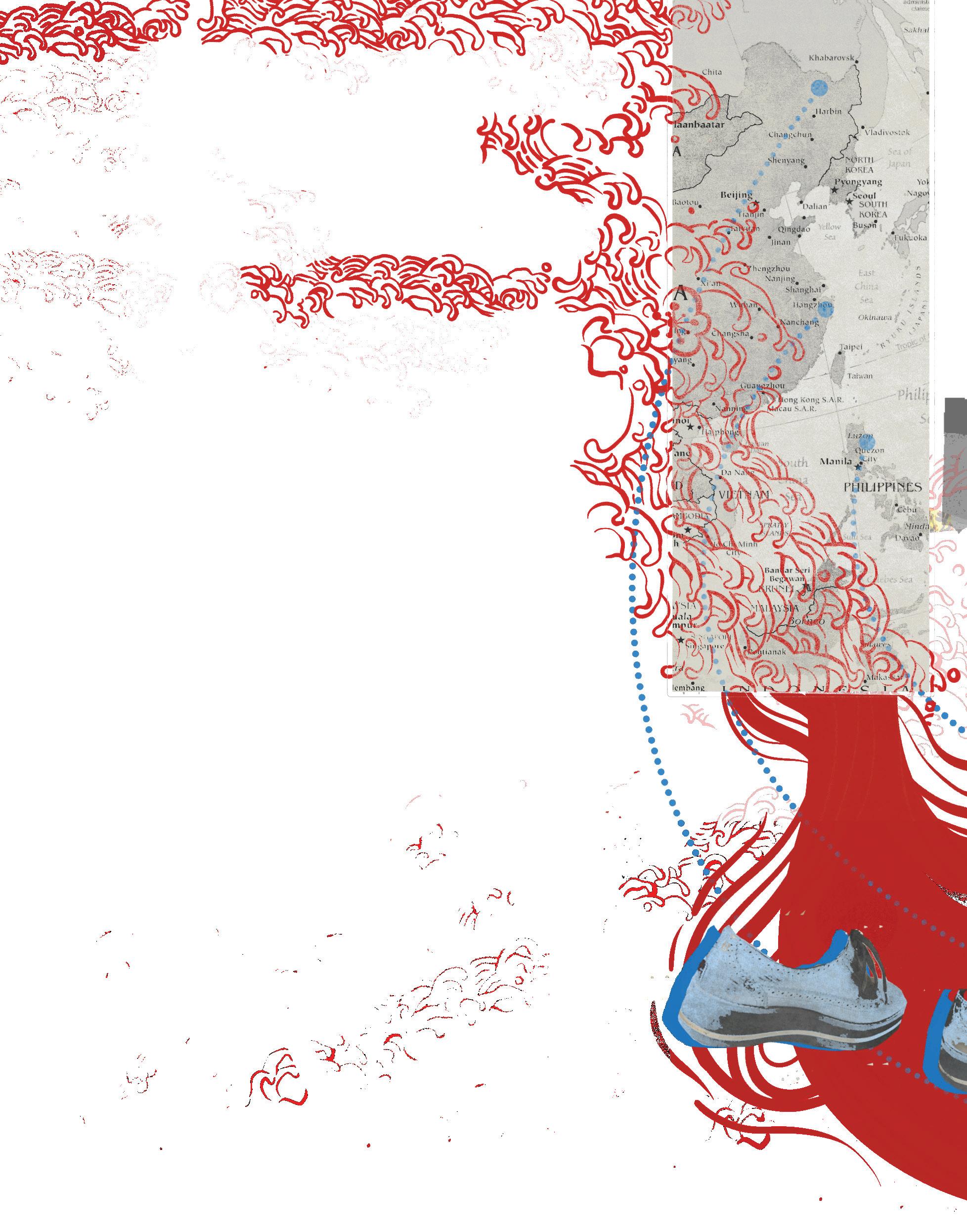 WORDS BY NATHAN BAWAAN
DESIGN BY ANYA ANBER AMEEN
WORDS BY NATHAN BAWAAN
DESIGN BY ANYA ANBER AMEEN
As students walked across the stage during a May 2012 commencement ceremony, the crowd burst into an applause that was decades in the making.
This applause was unique — it wasn’t just to celebrate graduation, but to recognize 76 Japanese Canadian UBC students who were forced into internment camps in 1942 before they could complete their degrees.
In total, 23,000 Japanese Canadians along the West Coast were forcibly evicted from their homes — a violation of their citizenship rights — and sent to these camps between 1942 and 1949 following the bombing of Pearl Harbor.
This ceremony came a year after the UBC Vancouver Senate approved a motion to grant these 76 students honorary degrees following years of advocacy, led by Mary Kitagawa, to get recognition from UBC about its complicity in the internment process.
Kitagawa, who was interned herself, started calling on UBC to grant interned students honorary degrees in 2008 after she read the University of Washington had done the same.
For three years, Kitagawa was met with indifference from UBC, who initially said the small number of Japanese Canadian students impacted by internment didn’t warrant honorary degrees.
However, in 2012, 10 living students of the 76 interned walked across the stage to get their degree. The remaining students who had died before the ceremony were represented by family members.
Among the clapping masses was Dr. Chris Lee. He was watching a generation of Japanese Canadian university students get their degrees, 70 years after internment started.
“The emotion of seeing the leadership — the university — on stage and recognizing this past was really important,” said Lee.
As the 10 living students got their degrees, the Chan Centre erupted into applause, said Lee.
“Everyone was standing, so we actually can’t see what’s happening on stage, [but] apparently after the first students curled around and went back to the back [of the stage] everybody just started weeping,” he said.
For Lee, seeing the students and
their family members on the stage was “incredible.”
“It was really seeing those students on stage that made everything make sense all of a sudden … that the past can be acknowledged, that we can actually do things in the present to begin to mitigate the hurts of the past … and that we have to commit to doing that,” he said.
Besides granting the 76 previously interned students with their degrees, the Senate approved two other motions — one committed UBC to develop initiatives to educate future students on the history of internment and the other committed the UBC Library to preserve historical records from the time of internment.
The first motion eventually became the Asian Canadian and Migration Studies (ACAM) program — a multidisciplinary, 18-credit minor that explores the history and culture of the Asian diaspora in Canada and Asian migration around the world.
The beginning
The ACAM program officially launched in fall 2014, three years after the Senate voted to develop educational resources on anti-Asian racism.
It was the third Asian Canadian-focused program in Canada. SFU created its program in the 1990s — although it has been suspended since 2017 — and the University of Toronto launched its version shortly before UBC.
Lee, now the ACAM director, said the three-year gap was, in part, a result of bureaucratic processes.
“All bureaucratic processes take way longer than we ever think they do,” said Lee. “Going to the Senate with the Faculty of Arts, and then going to the provincial government, that took a long time.”
The program developers — people like Lee and history professor Dr. Henry Yu — brought a motion regarding the creation of the ACAM program to the Senate in spring 2014.
Developers found there were few existing courses related to Asian Canadians and migration that could be used as graduation requirements for the program. According to Lee, there were only two related classes — a multicultural
film course and a history of Asian migration course taught by Yu.
“There was actually so little infrastructure that in some ways … we kind of created a structure for what would be a minor in ACAM,” Lee said. “I spent the first three to five years [as the ACAM] director really taking that apart and really building it.”
Lee also said the lengthy program development time was due to a conscious effort to include community consultations in the development process.
He said these consultations relied on existing relationships between those developing the ACAM program (like Lee and Yu), those who organized the 2012 ceremony for the 76 Japanese students and local community members. These consultations, according to Lee, revealed the diversity within the Asian Canadian community around the best ways to educate on anti-Asian racism.
“The range of ways in which a university can be responsive to and responsible to diverse Asian Canadian communities, I think that really came about in a very clear way during consultation,” Lee said.
This focus on community engagement continued even after the creation of the ACAM program — many ACAM courses involve assignments that have students work with local communities.
“Because of its origins … I think we knew that the program had to be responsive to community needs from the very start,” Lee said.
‘On the shoulders of many, many other people’
The creation of ACAM came from the Senate’s call to action to educate students on and preserve documents of internment, but Lee said it also fits within a broader context of Asian presence at UBC and in Vancouver.
Asian settlers, predominantly Chinese workers on the Canadian Pacific Railway, have lived in the Lower Mainland since the late 19th century — although the first recorded Chinese settlers in BC arrived in 1788 on Vancouver Island.
For much of this time, widespread anti-Asian racism discriminated against and targeted these immigrants, and this discrimination continues today.
8 | FEATURES | TUESDAY MAY 30, 2023
“UBC was part of that system [of anti-Asian racism], but also a place where a lot of students of Asian descent gravitated to,” Lee said. He noted a Japanese Canadian student, Tose Uchida, was part of UBC’s first graduating class in 1916 when the university was known as McGill University College of BC.
Uchida was UBC’s first Asian Canadian and Japanese graduate.
It was this history, and UBC’s ties to it, that motivated people like Lee, Kitagawa, Yu and others to advocate for educational resources on anti-Asian racism and Japanese internment in 2011.
“That’s a very important component because I find a lot of people in Canada do not know that such a horrible event happened,” Kitagawa told The Ubyssey in November 2011.
Despite the lack of a formal program, Lee said students and faculty have been discussing the “Asian Canadian experience before [they] even had a language for it.”
“People have been trying to do teaching and research and learning about Asian Canadians for many decades now, but often without the necessary spaces and resources,” he said.
Lee said the work of these people “catalyzed” the founding of the ACAM program by creating a network of alumni and community members who knew that education was an important tool to address anti-Asian racism and providing example frameworks for the program.
He also pointed to the First Nations and Indigenous Studies program at UBC as “instrumental” in helping developers create the ACAM program due to its longer history of teaching about histories of racism and empire in connection to local communities.
“I’m always aware that for every little bit of work that we do in ACAM, we really are on the shoulders of many, many other people
who’ve been doing this work for many years,” Lee said.
‘A story about us’
Carolyn Nakagawa was working on a research project for Lee in the summer of 2014 when she said he asked to see her transcript to see if she was eligible to graduate with the ACAM minor at the end of the academic year.
Nakagawa had already taken a few 300-level Japanese language courses earlier in her undergrad after spending a gap year in Japan — which Lee said counted for ACAM credit. She was also already signed up to take two English courses that counted for the minor since she was an English honours student.
After looking over her transcript and talking with Lee, Nakagawa also signed up for a history course. That course would grant her the ACAM minor.
“[The history course] was really an extension of the summer research work I was doing, as well as a really good supplement to [my Asian] diaspora literature coursework and to my thesis,” she said. “It was a no-brainer.”
When she started at UBC in 2010, Nakagawa didn’t know she would end up enjoying studying the Asian diaspora — she didn’t even have a major picked out. But, she said she’s glad that the ACAM program started when it did.
“I was just letting my interests guide me,” said Nakagawa. “I was fortunate enough that I was working with Chris Lee, and that the program was starting just in time for me to be able to get involved.”
Nakagawa was one of four students to graduate in the inaugural class of ACAM minors in 2015. Now, the program has around eight graduates each year.
The ACAM program has grown since its inception — for example, courses under the ACAM code didn’t exist until 2017, according
to Lee. Now, classes like ACAM 320B on Asian diaspora health and ACAM 350 on Asian Canadian media regularly fill up each year.
Lee compared the growth of the program to building a house.
“Thinking about the kind of house metaphor, we build a house that we’ve kind of lived in for the last 10 years that does certain things,” he said. “But the demand for ACAM work and the need for ACAM work, I think, exceeds what the house can carry.”
Even after nine years, many ACAM students seem to find the same value in the program’s courses.
“Learning about diaspora felt very familiar and helped me understand my own lived experience in a very different way,” said Nakagawa.
Shih-wei Wang, a fifth-year English literature and Asian language and culture student, echoed Nakagawa’s comment.
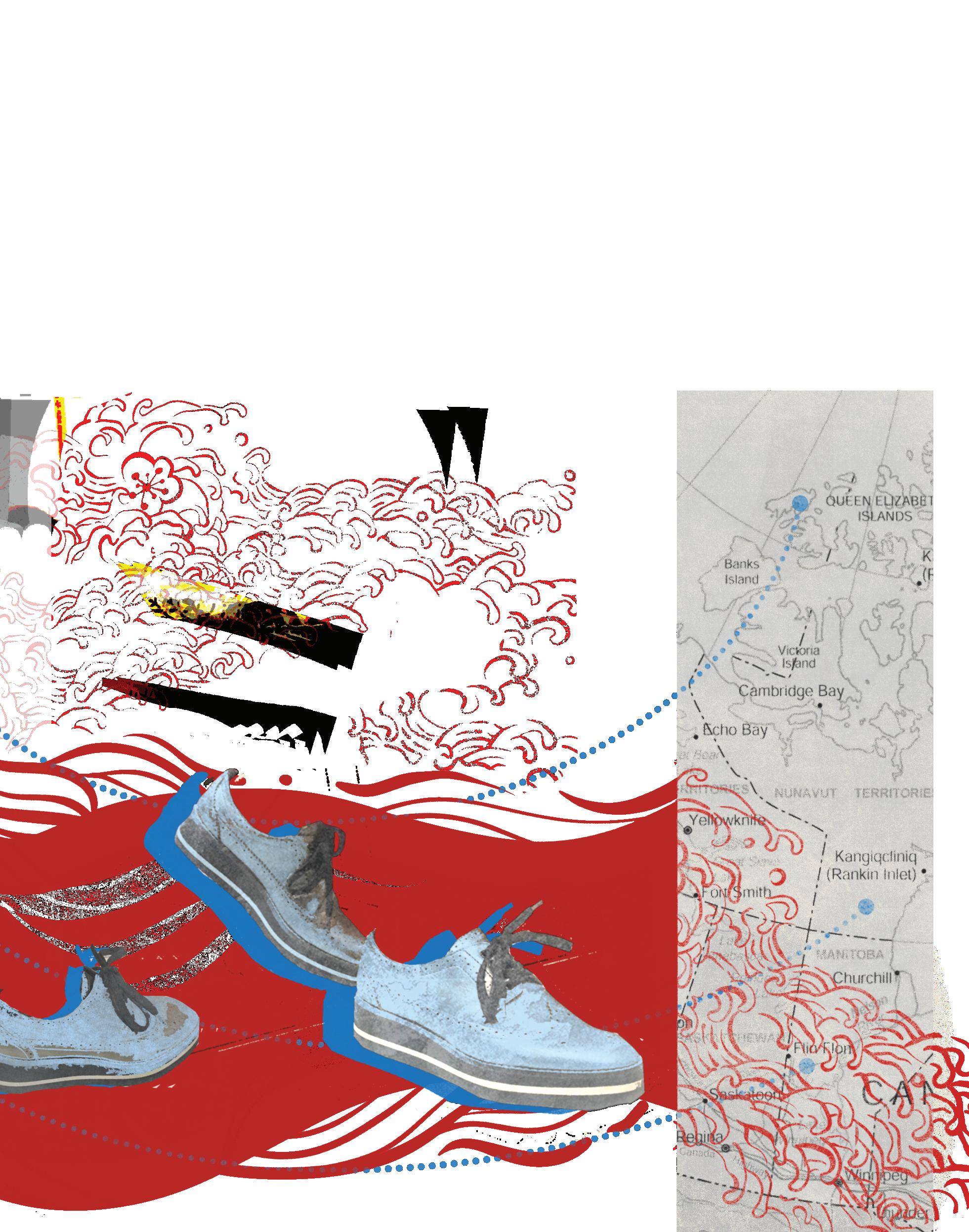
“A lot of courses in Asian studies, while they’re very fun, it’s almost like studying about Asian culture through Western discourse,” Wang said. “[ACAM] was so curated towards the Asian immigrant experience or the Asian diasporic experience. It wasn’t ethnographic ... it was a story about us.”
Wang added that her ACAM classes allow her to explore her racial identity and connect with her heritage — something she didn’t have the opportunity to do before. She also said ACAM courses gave space for her and others to share their mutual experiences — both good and bad — as part of the Asian diaspora.
“It’s not always about how upsetting the immigrant life is,” said Wang. “It’s about sharing the kinds of food that your mom makes that makes you really happy, sharing that moment when you haven’t seen your grandparents in a long time.”
Both Nakagawa and Wang
also mentioned the importance of learning about the history of anti-Asian racism, especially in Vancouver.
“There’s been these diasporic communities in Vancouver for decades,” Nakagawa said. “I think the more opportunities we have for UBC students to discover that type of story as part of the coursework, the better.”
Celebrations with community
Nakagawa and Lee were sitting in the St. John’s College dining room on the evening of May 8, 2015 for the inaugural ACAM graduation celebration.
The red brick walls were obstructed by balloons strung up around the room, and the curtains were drawn behind the podium, blocking out the light from outside.
One by one, each graduating
student went up to the podium to speak before receiving a goodie bag from Kitagawa and taking photos to commemorate their graduation.
The large dining room might have seemed too big to hold the program’s four graduates, but members and elders of the Asian Canadian community outside of UBC attended the gathering to celebrate the “well-valued” Class of 2015, said Nakagawa.
The buzz of graduation excitement and celebration didn’t solely come from the four ACAM grads, but also from the community that surrounded them.
“It really felt like the broader community was embracing us,” said Nakagawa. “Even people I had not met before that day were there to support me.” U
MAY 30, 2023 TUESDAY | FEATURES | 9
Ask Iman: Rapid-fire advice
 Iman Janmohamed
Features Editor
Iman Janmohamed
Features Editor
Ever asked Iman (hey, that’s me!) a question that was short, sweet and maybe not actually something anyone can actually give you advice on?
Well, this is for you! You asked. I answered. Below is a bunch of questions — some silly, some serious — that you’ve sent in.
Should I put milk in after cereal just to be more socially acceptable?
Yes. You must stop your terrible ways. What if you put in too much milk? Then what, more cereal? But then what if it’s too much? Do you save it? Throw it away? The logistics are making my head hurt.
I do a lot of writing for work and school but my TAs and coworkers always get annoyed when I use commas wrong. As an English major, can you teach me?
If there’s one thing I’m good at, it’s yelling at people (in a kind and loving manner) when commas are used incorrectly.
The main types of commas are listing commas, joining commas and bracketing commas.
Listing commas are used in lists (obviously) and can replace the word “and” or “or.” For example, in the sentence “Iman is very funny and humble and kind,” the first “and” can be replaced with a comma, and the second “and” can have a comma before it (unless you don’t use the oxford comma but that’s a whole ‘nother can of worms).
Joining commas bridge independent clauses by marking their separation. These clauses become one when joined by conjunctions. For example, the comma used here is a joining comma — “ The Ubyssey is UBC’s independant student paper, but CiTR is the radio station.”
Bracketing commas serve as quasi-em dashes. They set aside clauses, phrases or words that are added to a sentence, but not essential to its meaning. For example, the sentence “Spencer,
The Ubyssey ’s opinion editor, is from Vancouver,” has bracketing commas.
There are a bunch more rules — like using commas after introductory clauses that come before a sentence’s main clause and using commas to shift between a sentence’s main idea and a quotation — but that’s the gist. And if I messed up any commas in this piece, don’t @ me.
I have a hard time saying no to social outings, even if I genuinely need to take care of myself. How can I get better at this?
The answer comes down to understanding that you need to take care of yourself before you do anything else. Taking care of yourself and doing things like your laundry, cleaning your countertops, taking showers, charging your phone, etc. are all things that you need to do for you.
Becoming better at saying no comes from one thing — establishing that you come first. I know. It’s cliche, but true. You need to do those self-maintaining activities and keep working toward that degree. You shouldn’t feel like you have to blow off finishing your homework to hangout with your friends when you don’t want to. Having to feel like that eliminates the point of saying yes, which is to go have fun and relax.
Saying no might make you feel like you’re letting down your friends, but taking care of yourself isn’t something to be ashamed of. The fear of missing out is real, and damn, do I feel it a lot.
But you do not have to feel like you have to say yes to plans every single time, when you just don’t have the capacity for it. That’s valid. And in the end, you’ll likely find the times you do say yes, with the capacity and time for it, more worthwhile.
You’re doing great. Keep it up! U
Want to be told what to do by someone who was reminiscing about their Model UN days mere hours ago? You got it! Send your questions to Iman at advice@ ubyssey.ca , or submit anonymously at ubyssey.ca/pages/advice !
Introducing the editors on The Ubyssey’s 105th masthead
Ubyssey Editorial Board
The end of the school year means the end of our last editorial’s term — but also the start of a new one! New editors have been voted in from among our staff, and The Ubyssey’s editorial board has expanded, with the blog and opinion sections now having their own, dedicated editors. Here’s who will be leading each section of the paper this year.
The Ubyssey still operates over the summer — we’ll be printing one issue a month, and continuing to post articles on our website at ubyssey.ca. Sign up for our newsletter, Dingbat Mail, for updates through the summer.
Coordinating Editor: Anabella McElroy, coordinating@ubyssey.ca — your go-to contact for compli-

ments (and complaints) about the paper.
News Editor: Aisha Chaudhry & News Producer: Renée Rochefort, news@ubyssey.ca — home of breaking stories, where you can find non-stop reporting.
Culture Editor: Elena Massing, culture@ubyssey.ca — contact for art and student life on campus.
Features Editor: Iman Janmohamed, features@ubyssey.ca — contact for deep dives into all things UBC.
Opinion Editor: Spencer Izen, opinion@ubyssey.ca — contact for all criticism and commentary on issues facing UBC.
Blog Editor: Jocelyn Baker, blog@
ubyssey.ca — contact for all laughs, goofs and gaffes.
Science Editor: Tova Gaster, science@ubyssey.ca — contact with research to highlight, and stories about the tech, health, and environmental issues that matter to students.
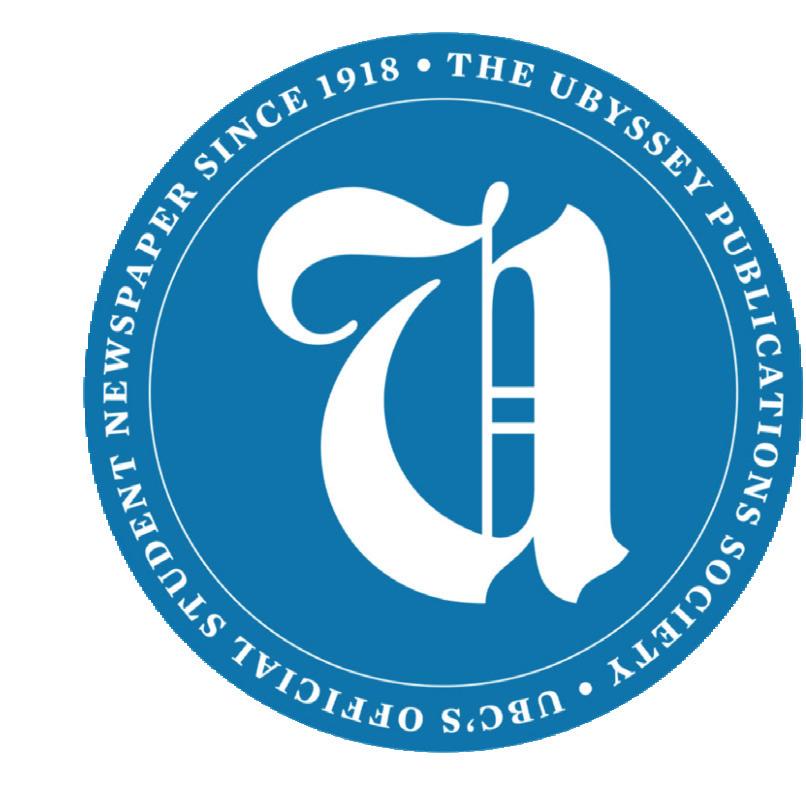
Sports + Rec Editor: Lauren Kasowski, sports@ubyssey.ca — contact for varsity coverage, recreation spotlights and all things movement.
Visuals Editor: Anya Anber Ameen, visuals@ubyssey.ca
Photo Editor: Isa S. You, photos@ ubyssey.ca
Video Editor: Ravnoop Badesha, video@ubyssey.ca. U
EDITOR SPENCER IZEN OPINION MAY 30, 2023 TUESDAY 10 YOUR UBYSSEY EDITORS //
The Ubyssey ’s newsroom is located in room 2208 on the second floor of the AMS Nest.
ISABELLA FALSETTI / THE UBYSSEY
ADVERTISEMENT
Ask Iman is The Ubyssey ’s advice column
(UN)SOLICITED ADVICE // Got opinions? Pitch your letters to opinion@ubyssey.ca.
MAHIN E ALAM / THE UBYSSEY
Dressing like King Charles to win my mother’s approval
Sidney Shaw
Senior Staff Writer
My mother sat me down at the dinner table. She took a deep breath as she does every time she is about to tell me something earth-shatteringly important.
“Sidney, I really need to tell you something,” she said. “I thought you would figure it out by the time you turned 20, but it is clear to me now that you haven’t.”
“Yeah mom?” I blinked, innocently.
“You have terrible style. I think you need to change.”
May 6; Coronation Day. I was still trying to deal with the trauma from my mother’s shocking news when regal music wafted from the TV. I sat on my couch just chillin’ watching King Charles sit on his throne just chillin’, and I thought, “damn. He and I are the same.”
Then it hit me like a million dollar air-conditioned carriage. This 74-year-old skeleton is the solution to all my fashion faux pas! I whipped out a (fashionably) beaten up Moleskine notebook (the kind that every pained non-artist has) and designed the following fits.
THE ‘IS HE STILL ALIVE?’
I love historical dramas. What could be better than dressing like I just walked out of one?
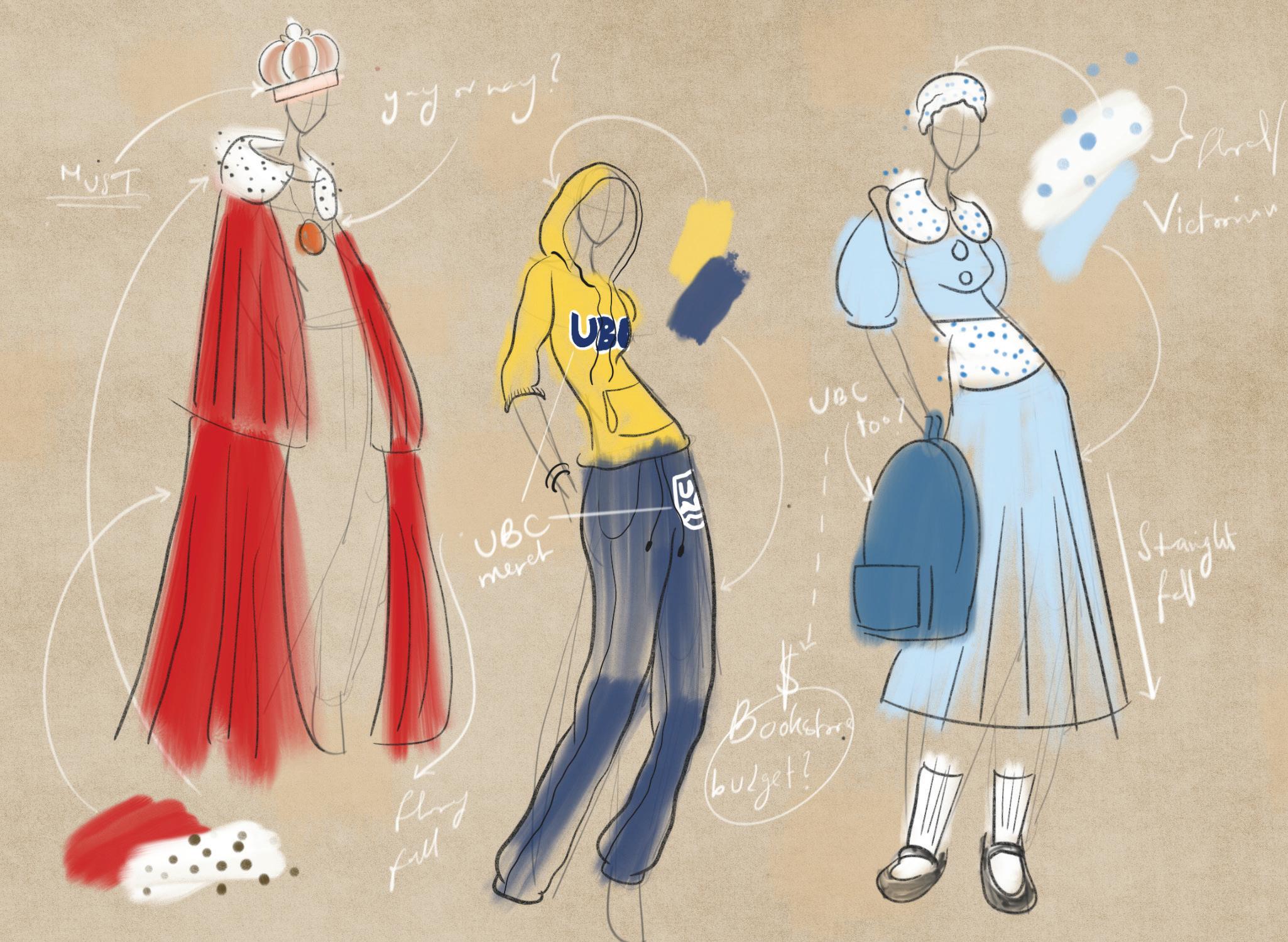
King Charles is old. He is a historical drama. I bet when he was a kid, he still had to wear those long, old fashioned nightgowns, like that girl from The Ring . Why not just do that?
My summer school classmates will shudder in fear at the cold, pale, ghostly Victorian child that haunts their 9:30 a.m. online ANTH 206 class. AKA ME.
THE ‘I JUST WOKE FROM MY NAP AT 12:58 P.M. FOR MY 1:00
P.M. CLASS’
Like the unproblematic king, I always keep this backup outfit at my disposal for situations where I’ve already emailed-in “sick” twice that week (I know; sick as hell). Unfortunately, I am not permitted to describe this fit in detail. But if you need a little inspiration, take a quick field trip to Wreck Beach!
THE DRIP
King Charles is a decorated man. He has medal after medal dripping off his body. One day, I too will be a drippingly decorated person, but until UBC gives me that damn BSc paper and one-gallon hat (cause it’s water holding capacity sucks, which brings you more drip), I’m afraid that I have to make do with random objects around the house.
That participation trophy from grade 6 soccer? Throw it on my head!
Chocolate coin? Lick one side of it to stick it onto my chest!
My duvet? It looks just like the coronation cloak, and it also helps cover up the previous fit for legal reasons!
THE UBC MOM
Two outfits fall into this category:
I HAVEN’T BEEN ON TIME IN YEARS! //
Manya Malhotra
Contributor
1) The mom who is terribly proud of the UBC child and wants the whole world to know. She wears a “UBC Mom” T-shirt, drinks out of UBC shot glasses and alternates between the “UBC Distressed Bum Print” sweatpants and the UBC x lululemon yoga pants. Achieving this is simple. I’ll go to the UBC bookstore and buy everything that I would never buy as a student.
2) The I-do-not-give-a-damnwhere-my-trashgoblin-of-a-
child-goes-to-school-as-long-asit-gets-them-off-the-couch mom. To do this, all I need is to closely inspect my mom and then replicate everything she wears. If she wears it, then she can’t criticize the fit on me, right?
Update: I was wrong.
THE TRASHGOBLIN OF A CHILD
Once again in my life, my mother has left me no choice but to
Howto be late for your 8 a.m. class
Are you struggling to show up less than 10 minutes early for your 8 a.m. lecture? Is listening to your professor talk about the new trick his cat, Brandii (spelled with two i’s), learned over the weekend not your ideal Monday morning conversation? If your time management skills are too good for your own good, this article is for you. With summer courses getting into full swing, here’s how to show up late for your 8 a.m. class.
WEAR SLIPPERY SHOES
Vancouver weather is currently blessing us all with loads of vitamin D (go to town with that sunscreen, folks!), but the weather will eventually start getting icky, rainy and miserable again.
When it does, slippery shoes will be your knight in non-waterproof armour. Just strap on those non-weather-appropriate sandals or those pretty pink party shoes you’ve never worn and don’t remember buying and step onto the slippery path to your 8 a.m. class.
You might (will) slip, fall and hurt yourself but the dignity you lose will be worth the comfy back-of-the-classroom seat you gain by not being the first puffyeyed student to enter your 8 a.m. lecture.
GO CLUBBING THE NIGHT BEFORE
Nothing screams “I’m going to be late for class,” like a good ol’ hangover. You will either be too hammered to get up on time or be dreaming about (and with) that guy you hooked up with the previous night.
Either way, when the clock strikes 8, you will be as far away from an academic building as you were from a responsible choice the night before.
TURN OFF YOUR ROOMMATE’S ALARM
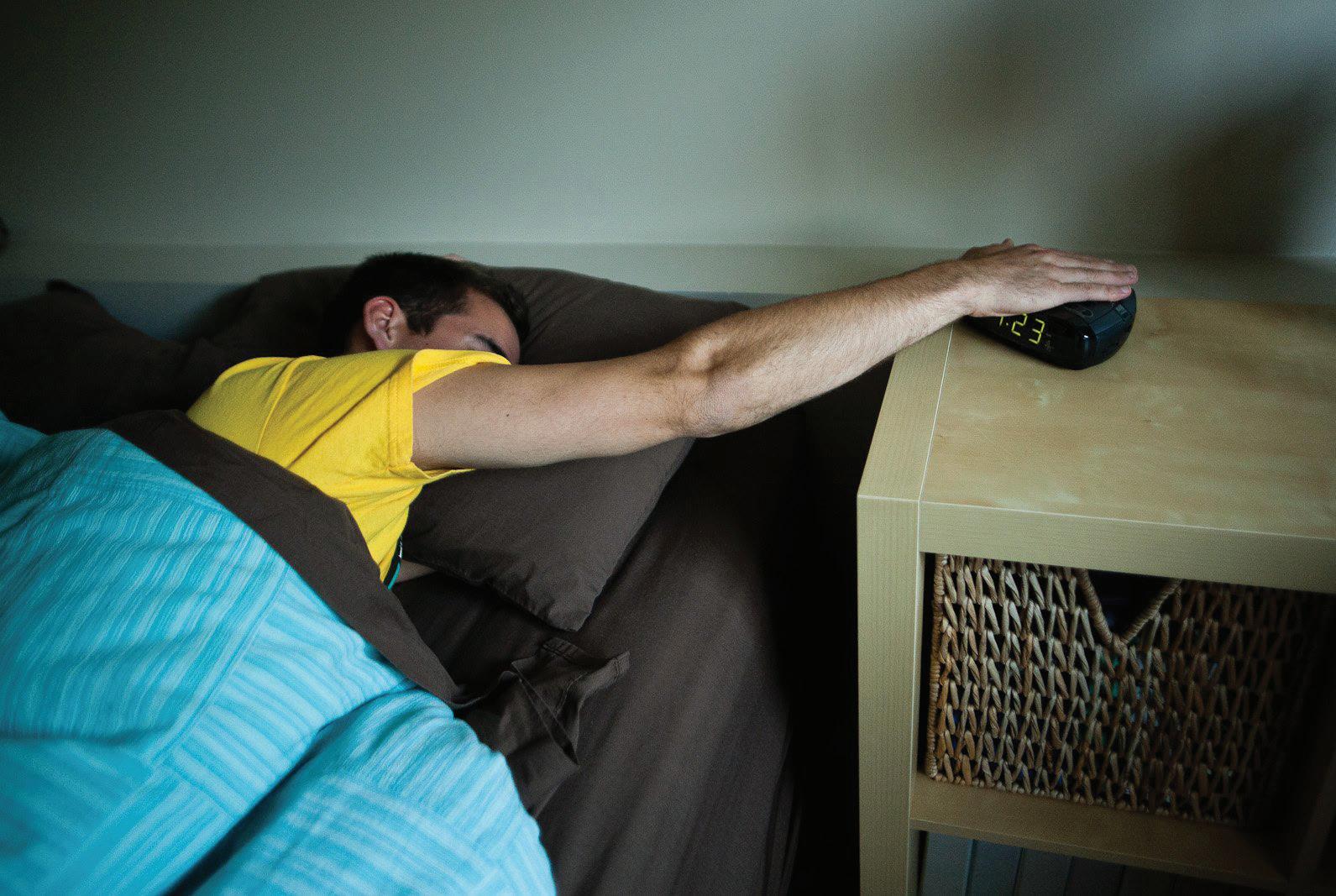
Let’s face it, you rarely ever get up from the sound of your own alarms, but when your roommate snoozes their morning alarm for the 29th time, your beauty sleep transforms into a beastly one.
Turning off your roommate’s alarm will let you catch up on those crucial minutes/hours/ days(?) of sleep you missed due to your important and healthy obsession with scrolling through Instagram reels at midnight.
Fuck 8 a.m. engineering classes, you need to celebrate the Shawn Mendes and Camila Cabello reunion while watching John Cena savour every bit of his sandwich!
PULL YOUR RESIDENCE BUILDING’S FIRE ALARM
If you’re living that res life, you know that fire alarms are a near-daily occurrence, so pulling one in your time of need will likely not give you any bad karma. But I make no promises because, unlike Ms. Swift, karma is NOT my boyfriend. Honestly, right now, no one is [cue sad
retreat into the deep dark corners of my couch. I suppose I must spend the bulk of my twenties actively protesting the royals who have brought me so much anguish by donating $10 to Megan Markle and watching Suits on repeat untilWAIT! That’s it! What my mom really wants from me is to wear a suit! U
Blog is The Ubyssey’s humour section. Don’t take us too seriously. background music]. Anyways.
Pulling your fire alarm early in the morning will leave the sensible and rational individual that you are no choice but to exit the building and wait for the fire brigade to do their thing before you go back in.
Not only will this make you late for your class, you will even have a valid excuse for your professor. It’s win-win situation for you.
The only casualties are a couple of inconvenienced students who probably had far more important things to do than live out your elaborate lie just so you could catch up on some extra minutes of sleep— honestly, shame on you! And fuck the firefighters, it’s not like they have anything better to do.
Life is too short to be ‘on time’ and ‘a good person,’ so pull that conveniently located fire alarm! You deserve it. U
Blog is The Ubyssey’s humour section. Don’t take us too seriously.
EDITOR JOCELYN BAKER FROM THE BLOG MAY 30, 2023 TUESDAY 11 THE SOLUTION TO ALL MY FASHION FAUX PAS //
It’s giving King Charles meets Orchard Commons move-out donations.
ANYA ANBER
Unplug, don’t snooze!
AMEEN //
THE UBYSSEY
JOSH CURRAN // THE UBYSSEY
Softball season ends in double elimation playoffs
Disappointing end to baseball season after loss in national tournament
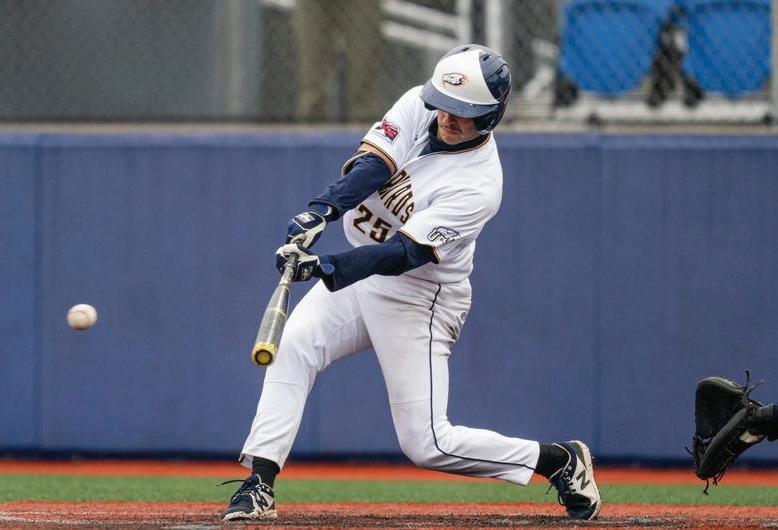
Golf teams capture division banners after tournament wins
Despite making their sixth straight Cascade Collegiate Conference (CCC) playoff appearance under head coach Jennifer McKellar, the Thunderbirds’ softball season ended earlier than expected. The team finished their regular season with a 17 – 13 record and headed into the CCC playoffs in the fifth seed. In the double elimination playoffs, the ‘Birds dropped a nailbiter 1–0 to the fourthranked Eastern Oregon University Mountaineers. Then on the brink of elimination, the Thunderbirds put up a fight but weren’t able to hold off the Southern Oregon University Raiders’ offense. The 8–5 loss sent the Thunderbirds home for the season, but the future looks bright with many returning players and strong pitching from Shae Sever.
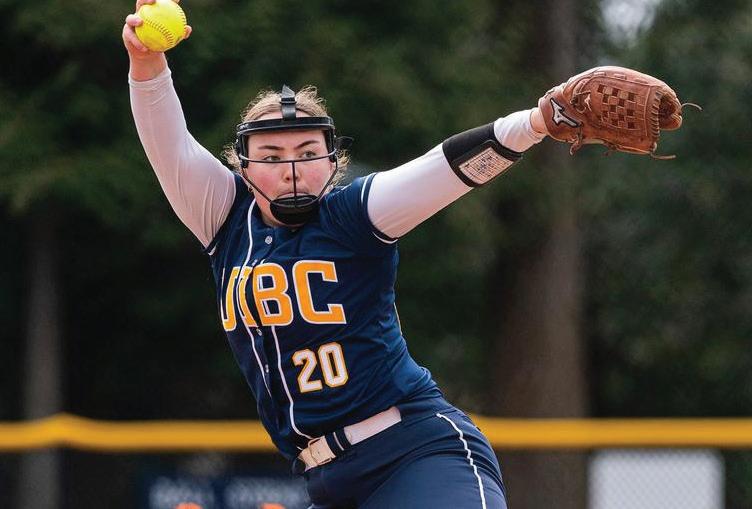
A BIT IRONIC SO SAVE FOR LATER //
Just over a week after winning UBC baseball’s first Cascade Collegiate Conference championship, the Thunderbirds’ season was sadly over in the National Association of Intercollegiate Athletics (NAIA) Opening Round tournament. A home run from outfielder Jonny McGill propelled the T-Birds to a 11–10 win against the Antelope Valley Pioneers, but the momentum couldn’t carry into the subsequent games. Even with strong pitching from Sean Heppner and hits from Kyle Anderson, the ‘Birds lost 7–6 to the Westmount Warriors. With a 10–2 loss to the Vanguard University Lions, UBC’s fate was sealed. Next season, the team will look to improve upon their 16–8 regular season record.
Both UBC golf teams won national championships after successful NAIA tournaments. The women’s team was poised to win from the start of the season and lived up to the pressure, winning their second consecutive championship by a dominant 29 strokes. Second-years Sonja Tang and Una Chou led the way, scoring +15 and +16 for fourth and seventh individual places respectively. On the men’s side, the tournament started on a rougher note, sitting in fifth place after the first day of play. But thanks to a strong on-par performance from Hudson LaFayette and birdies from John Paul Kahlert, the men surged into first with a three-stroke victory over The Master’s University Mustangs for their first NAIA championship since 2008.
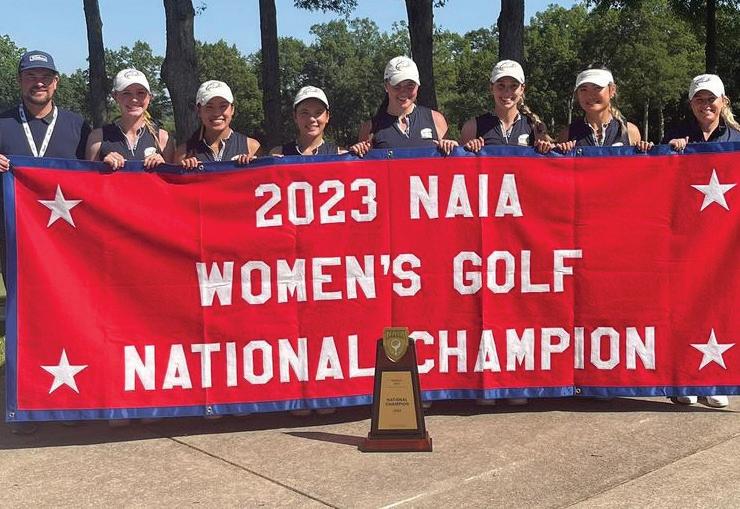
Thunderbird athletes shone at the NAIA Outdoor Track and Field national championship in Indiana this past weekend. As defending conference and national champions, hopes were high for the women’s team. The ‘Birds won many gold medals — Sonya Urbanowicz captured the gold in pole vault, Olivia Lundman in the 5000 meter race walk and Katie Newlove in the 5000 meters, among others. The men’s dreams for a championship will have to wait another year as they finished in second. The future looks strong though, since third-year Rowan Hamilton held onto his three-time title as the national champion in hammer throw and rookie Nate Paris became the first T-Bird to win the men’s decathlon in 13 years. U
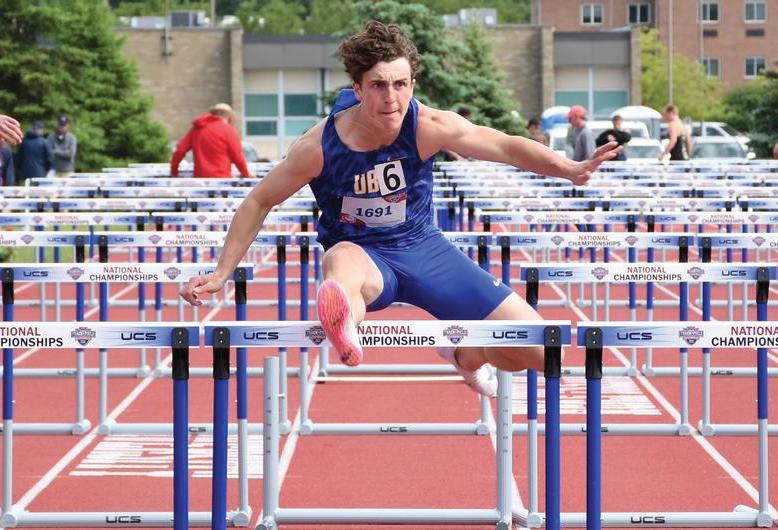
Places to Be: Winter backcountry camping in Garibaldi Provincial Park
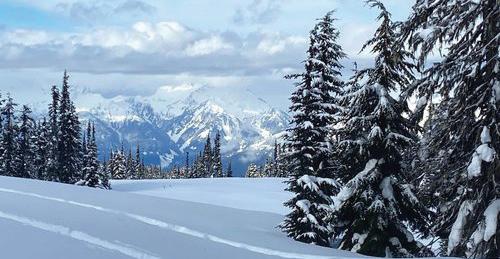 Tori Fitzpatrick
Tori Fitzpatrick
Contributor
We began hiking from the Rubble Creek trailhead at 11 a.m. on a Saturday. Wet, heavy snow fell around us as we pulled crampons around our hiking boots and began our ascent. The first 7K involved hiking up steep switchbacks on packed snow. As we climbed higher, the trees thinned, and beams of sunlight shone through the gaps in the branches. The wet snowfall turned into light, airy snowflakes as we gained elevation.
This was the start of my first backcountry winter camping trip. On the first day, we planned to hike 16K and gain 1225m of elevation. The second day would be much easier, as we would cover only 7K, most of which would be a descent. We planned a point-topoint hike rather than a loop or an out-and-back; to achieve this, we parked one car at our starting point (the Rubble Creek trailhead) and our endpoint (the Cheakamus Lake Forest Service road).
I quickly learned that one of the most important aspects of winter camping is being flexible with your plans. Before our hike began, we hit our first roadblock — we could only drive 1K up the unplowed 7K Cheakamus Lake Forest Service Road. That meant we would have to hike an extra 6K on the Forest Service Road at the end of our second day. Thankfully, we had planned a short second day.
The first half of day one was slow and strenuous. We all breathed a sigh of relief when we reached Taylor Meadows, which meant we had completed most of the elevation for the day. There, the trees opened up and gave
way to a sunny clearing covered in powdery snow, deep enough to bury the campground kitchen shelters. Rugged snowy peaks surrounded us; our trek through the trees was well worth the view. We entered Taylor Meadows around 4 p.m., which meant we only had two hours before sunset and 9K left to hike before we reached our planned campsite. As we slowly snowshoed through the vast meadows, we realized we would not make it to our campsite before sunset. We modifed our plan and only hiked another 4K before setting up camp in the meadow by a patch of trees that would provide shelter from the wind. It was a relief to finally set down my pack and relieve the strain on my back and shoulders. We quickly set up our tents before the sun went down and then put on our headlamps to cook dinner in the dark.
I will admit that I was nervous about winter camping, especially in the BC backcountry. I moved to BC this fall to begin my master’s degree after living my entire life in Atlantic Canada. When I arrived, I was immediately captivated by the vastness of the backcountry. However, the wilderness in BC presents many risks I was unaccustomed to. When preparing for the trip, avalanches, tree wells and large predators were all on my mind. Luckily, I was accompanied by more experienced hikers who were avalanche trained and planned a route that would only cover low-risk avalanche terrain. Even so, it was a challenging trip, and there were times when I questioned whether winter camping was for me.
The next morning, we awoke to the sun shining brightly
through our tent. We ate breakfast under the gaze of a towering peak shining in the sunlight. Though the second day was mainly downhill, it would prove to be more challenging than the first. Shortly after we left our campsite, the tracks from previous hikers vanished and we briefly lost the trail. Thankfully, the most experienced hikers among us mapped our trip with AllTrails and navigated us back to the trail. This involved hiking unmarked paths up steep inclines in our snowshoes, which greatly slowed our progress and called for numerous breaks.
After we found the trail again, we stopped for lunch at Helm Lake, where we had a perfect view of the magnificent Black Tusk, a jagged volcanic rock part of the Garibaldi Volcanic Belt.
After lunch, I felt rejuvenated and ready to tackle the remaining 15K
of our hike. The next portion of the hike was the highlight of the trip for me. The sun was shining brilliantly as we traversed flat ground surrounded by majestic snow-capped peaks. Being the only people on the trail, I felt so grateful for the opportunity to peacefully experience my surroundings and enjoy the quiet of a snow-covered landscape.
As we descended, we returned to the thick forest for the remainder of the hike. The descent was steep, and my legs were beginning to feel the effects of carrying a heavy pack. Finally, the path levelled off as we reached the Cheakamus River bridge, a sign we were close to the service road.
We reached the end of the trail at sunset and continued in the dark along the forest service road. Though the road was relatively flat, and we walked on a path of packed snow, this portion of the hike was
the most mentally challenging. Finally, as we descended one final hill, my headlamp lit up our car in the distance, and I felt a sense of elation. We had done it!
If you are someone who enjoys long hikes and backcountry camping, this route through Garibaldi might be for you. It provides rewarding views without traversing high-risk avalanche terrain. However, ensure you are adequately prepared for the potential risks before your trip. AdventureSmart BC and Avalanche Canada are great starting places to learn more about winter safety in the backcountry and how to read the avalanche forecast for your area.
Though this experience will undoubtedly challenge you, when you find yourself trekking across a snow-covered valley underneath the staggering Black Tusk, you will surely agree this is a place to be. U
EDITOR LAUREN KASOWSKI SPORTS+REC MAY 30, 2023 TUESDAY 12
VARSITY UPDATES
Women win gold, men take silver at track and field championships
ATHLETICS
JEFF SARGEANT / UBC
BRETT TUDELA / NAIA GOLF
RICH LAM /UBC THUNDERBIRDS
RICH LAM / UBC THUNDERBIRDS
The view of the surrounding mountains from Taylor Meadows.
TORI FITZPATRICK / THE UBYSSEY
German president visits UBC’s green energy research hub
Anabella McElroy Coordinating Editor
Applied science research groups at UBC showed off their work during a visit from German President Frank-Walter Steinmeier last month.
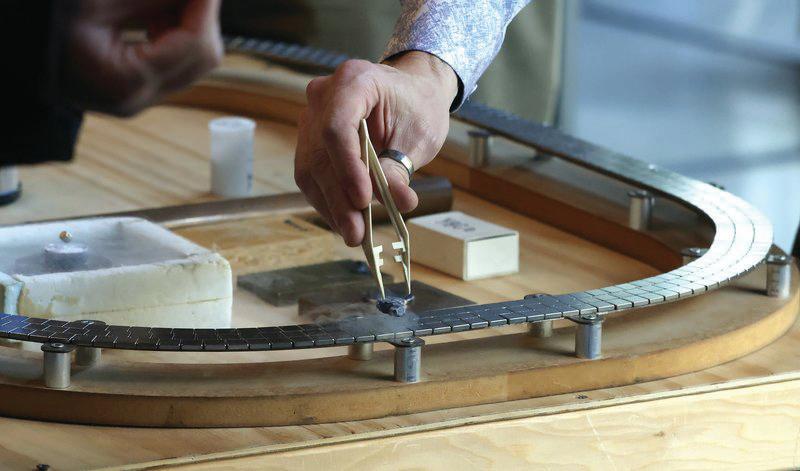
Steinmeier was on a four-day visit to Canada, with a delegation including Germany’s Minister of Education and Research Bettina Stark-Watzinger and various business and science representatives.
The delegation was welcomed to campus by UBC’s Interim President Deborah Buszard and Musqueam Chief Wayne Sparrow — with a focus on international collaboration for clean energy.
HIGHLIGHTING GREEN HYDROGEN
Steinmeier’s visit started at the Smart Hydrogen Energy District (SHED), an upcoming renewable energy hub that provides solar and hydrogen power to campus while testing new innovations.
SHED, led by applied science Associate Dean, Research and Industrial Partnerships Walter Mérida, won’t be producing a high volume of hydrogen to export. Rather, it is intended to be a “living lab” — a hub to experiment with sustainable energy system design at a city scale with the goal of exporting its innovations elsewhere.
SHED comprises a whole
block between Wesbrook Mall and Thunderbird Boulevard, but the central hub where the visit took place is between Thunderbird Parkade and the skate park.
A few years ago, the block was a basketball court. Now, it’s dominated by grey containers for hydrogen storage and production, alongside a hydrogen fuel pump sitting under a latticed wood and glass roof.
Germany has been urgently searching for renewable energy sources since the war in Ukraine put a spotlight on the country’s reliance on Russian fuel. Hydrogen can be used as a low-emission alternative to fossil fuels, but is energy-intensive to produce. Last summer, Canada signed an agreement to scale up hydrogen production enough to export “clean” hydrogen to Germany by 2025.
SHED is part of that effort. Bright new signs adorn the area explaining various components of the upcoming project, including solar panels on Thunderbird Parkade and new bi-directional electric car charging stations. While cars charge, they will work together as a giant battery in the SHED energy storage system.
“We are trying to demonstrate that it is not a zero sum game — we can have clean growth, and
at the same time reduce our environmental impact,” Mérida said.
Sparrow highlighted the importance of clean energy as part of a broader Musqueam value of sustainability.
“Our job as elected leaders is to leave our community … as
close as possible as they were here when we took control, and we live by those values,” he said. Sparrow gave Steinmeier a beaded blanket as a token of appreciation, and an art print of orcas to emphasize the importance of protecting the oceans. U
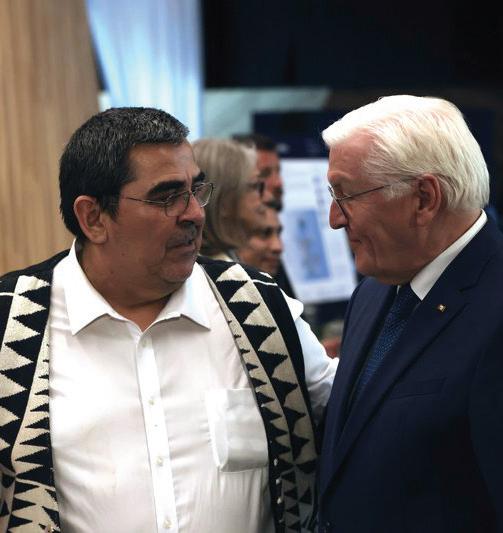
Undergrad research on BC sex ed wins national competition
ing consequences.
The team’s report defines CSE as education which “empowers young people with the knowledge and skills to make informed decisions about their health, in line with their own beliefs and values.” According to UNESCO, it’s a human right.
BC’s CSE curriculum was redesigned between 2016 and 2019, a recent update that makes it one of the most comprehensive in the country, according to sexual health educator Saleema Noon. It’s deliberately broad to give teachers flexibility.
But, that broadness means if a teacher doesn’t feel prepared to teach about topics like consent, they won’t. In fact, The Tyee reported in 2022 that the word “consent” never actually appears in the curriculum, replaced by vague terms like “healthy relationships.”
health educators, including UBC professor Dr. Kristen Gilbert. They also conducted their own survey of BC residents over 18 who had graduated from a BC high school within the past five years.
The team found that not only is CSE delivery not adequate in BC, but it’s often inequitable.
“[CSE] quality depends on what school you go to, and ultimately what school district you’re in,” said Ramji.
Wealthier school districts can outsource sex education to specialized educators. Rural and/or lower-income districts often don’t have the same access.
Tova Gaster Science Editor
On paper, BC’s province-wide sexual education curriculum covers everything from contraception to conflict resolution. But, according to a team of UBC undergraduate researchers, cracks start to show when you look at what’s actually happening in classrooms.
Undergraduate science students Raiyana Alibhai, Gabriela Villamil and Jenna Ramji were one of four Canadian winners of the international Map the System contest for their research on sex education in BC.
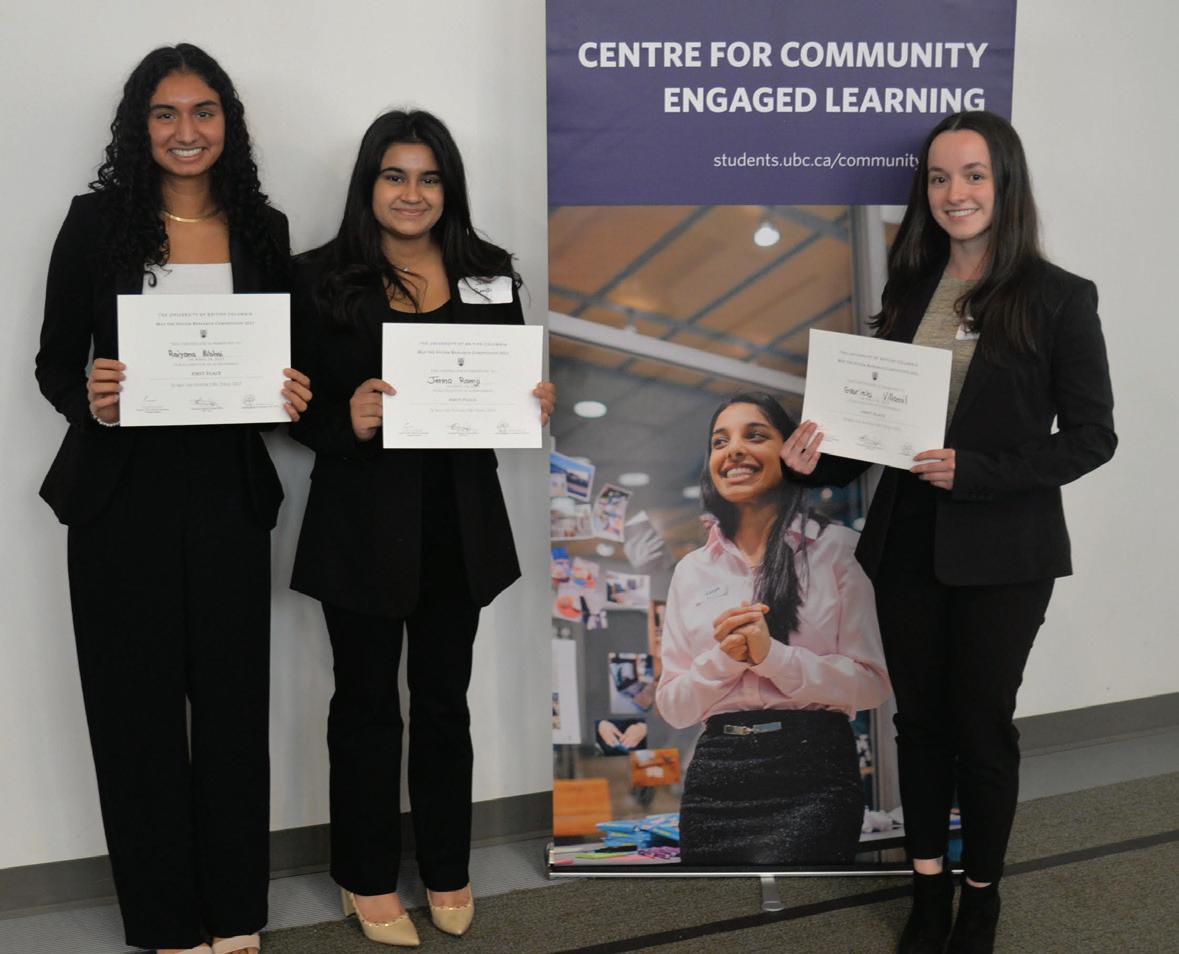
Map the System is an international research competition focusing on issues of social and environmental change, facilitat-
ed by the Centre for Community Engaged Learning at UBC.
“Because the delivery of education is not adequate, students aren’t receiving the sexual health education they deserve and that they’re entitled to according to sexual health education being a human right,” said Alibhai.
CURRICULUM SHAKY ON CONSENT
The Map the System team found vague language in the provincial curriculum and a lack of teacher training leads to many youth lacking comprehensive sex education (CSE). That leaves them unprepared for relationships, STI’s, pregnancy and other aspects of sexuality that can have life-alter-
“The curriculum is good, but what students are actually learning in the classroom can differ based on their school, or their teacher,” Alibhai said.
The researchers’ Map the System report echoes demands from student protests across the province for better education and policies to address sexual violence in schools. In April, 2022, Victoria high school students demonstrated at the BC Legislature to raise awareness and to demand outsourced education on consent in the classroom.
STEEP COSTS FOR CSE
To get a comprehensive look at sex ed in BC, Alibhai, Villamil and Ramji interviewed two sexual
“With rural regions, it’s hard to outsource to sexual health educators, because there are less located there,” said Alibhai. “There are less sexual health clinics there, and less resources for students to go to when they need this information.”
BREAKING THE CYCLE OF STIGMA
Alibhai said the lack of CSE creates a self-reinforcing loop of toxic silence around sexuality.
“Shame and stigma lead to adults who are uncomfortable teaching sexual health education, which leads to a lack of knowledge and comfortability of the students, which leads to more shame and stigma,” said Alibhai.
The goal of the team’s Map the System project was to identify ways to break that cycle. Their report asks the provincial government to increase funding to train and monitor teachers.
“One of the suggested inter-
ventions that we had for our system was really the need to implement more of a consistent standardized teacher training program,” said Ramji. “Teachers are expected to deliver this curriculum but there’s no training at all for how to deliver it.”
They also advocate for mandated CSE to continue past tenth grade — currently, that’s where it stops.
REPRESENTING UBC WORLDWIDE
Their project started in ISC I360 (Systems Approaches to Regional Sustainability). As the class discussed how the lack of CSE affects women worldwide, Alibhai, Ramji and Villamil began making connections to their experiences growing up in Vancouver.
“We all went to high schools in urban areas and West Vancouver, so we had the opportunity to get outsourced sexual education,” said Alibhai. “And as we further looked into this topic, we realized that not every student has the same ... opportunities.”
Now, they hope to use Map the System to share the importance of CSE on the global stage as they represent Canada at internationals in Oxford in July.
“Regardless of how far we went into the competition, we were also glad that we were shining a light on this topic, because it’s not nearly talked about enough,” said Alibhai.
“That was one of the other really positive things coming out of this is more awareness around sexual health education in BC.” U
EDITOR TOVA GASTER SCIENCE MAY 30, 2023 TUESDAY 13 GET ENERGIZED //
MAP THE SYSTEM //
ANABELLA MCELROY / THE UBYSSEY
Alibhai, Ramji and Villamil (left to right) celebrate their win.
COURTESY RAIYANA ALIBHAI
ANABELLA MCELROY / THE UBYSSEY
Sparrow and Steinmeier discuss sustainability.
Researchers display a project on superconducting metals.
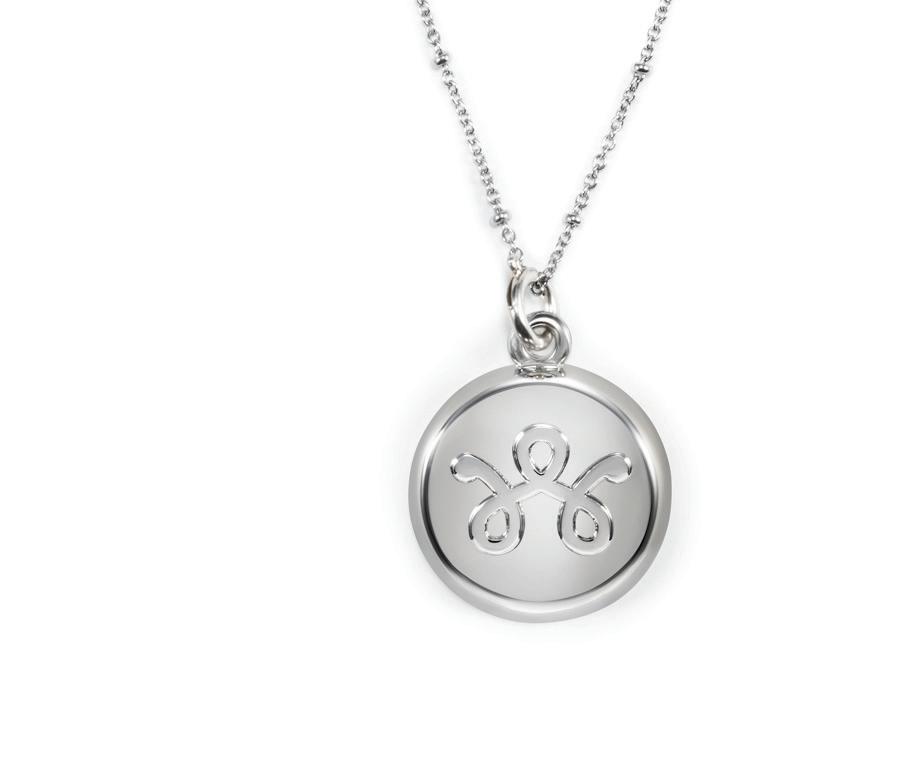

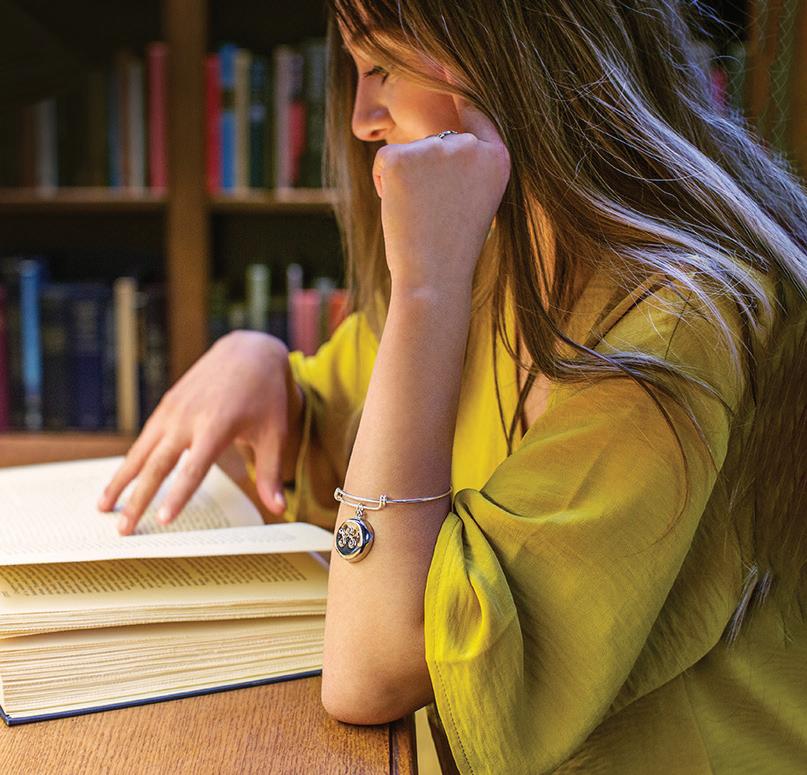

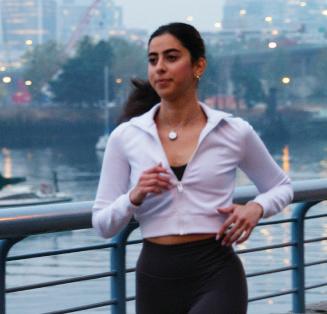

14 | TUESDAY MAY 30, 2023 Take control of your personal safety, on and off-campus. Exclusive TELUS SmartWear Security savings for UBC students. The promotional offer is valid until January 1, 2024. Offer includes $5 incremental equipment credit described above on top of current in market SmartWear Security equipment credit and the first month of subscription free. Offer available to new TELUS SmartWear Security customers who have not had TELUS SmartWear Security in the past 90 days. Regular monthly rates will apply at the end of the 1 month offer period (currently $15/mo.). If the customer cancels the service within the first 30 days the equipment must return to TELUS. Equipment can be financed on a one-year term. Remaining device balance due upon service cancellation within one year. Offers and regular pricing subject to change without notice. OFFER CODE: SWSTUDENTS5. © 2023 TELUS. 23-0528 TELUS SmartWear Security features a line of discreet personal safety devices disguised as necklaces, bracelets and keychains – each one equipped with a hidden button that can instantly text your GPS location to select contacts and/or emergency services when you need it most. Get an extra $5 savings on any SmartWear Security device, in addition to any in-market offer. Plus, TELUS customers save an additional $3/mo. on a monitoring plan, and your first month is free.* Scan this QR code and use promo code SWSTUDENT5. Studying alone An added layer of protection for when you’re: Commuting Socializing Working out 23-0528 University Collateral-flyer-UBC.indd 1 2023-04-21 1:31 PM
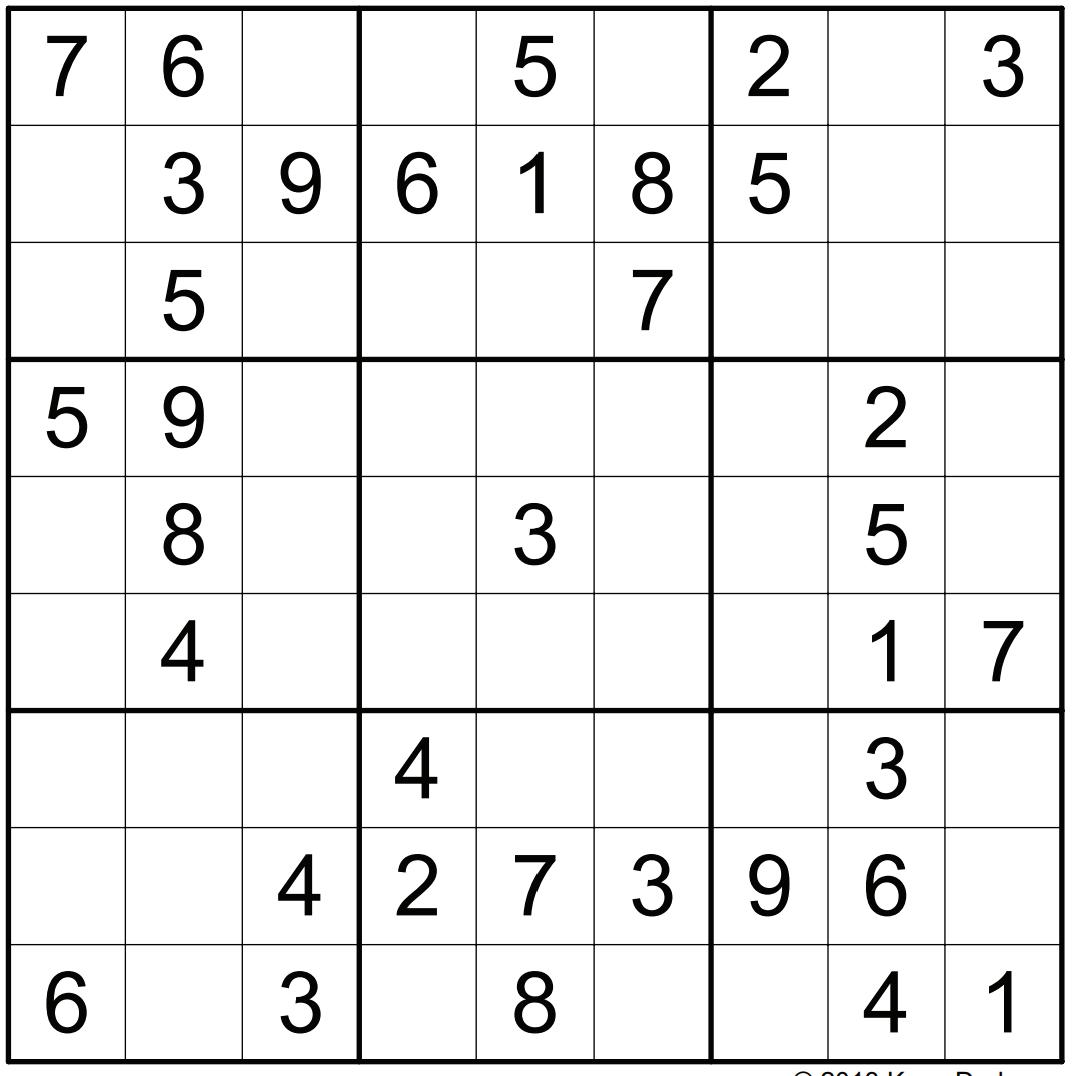
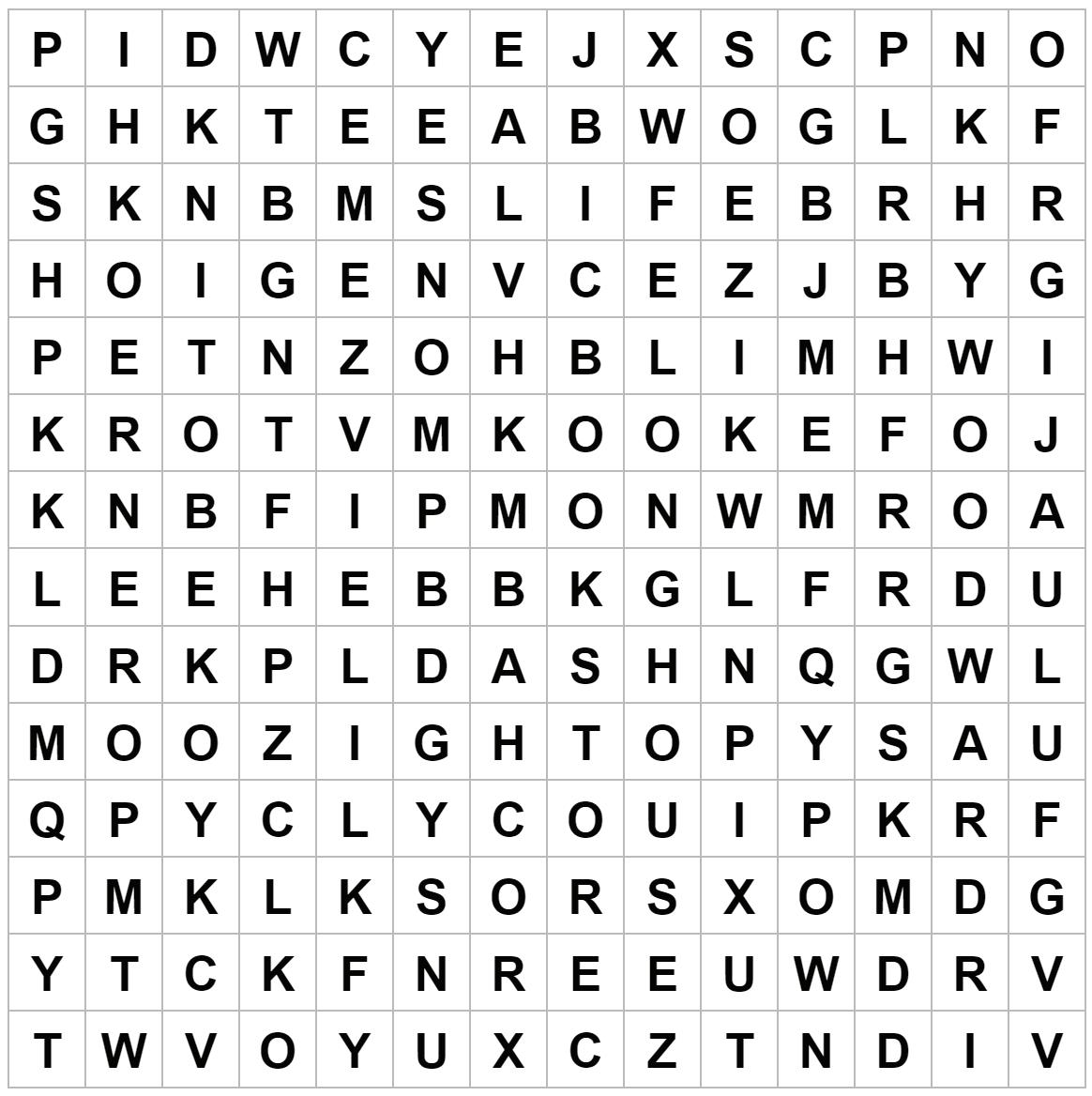
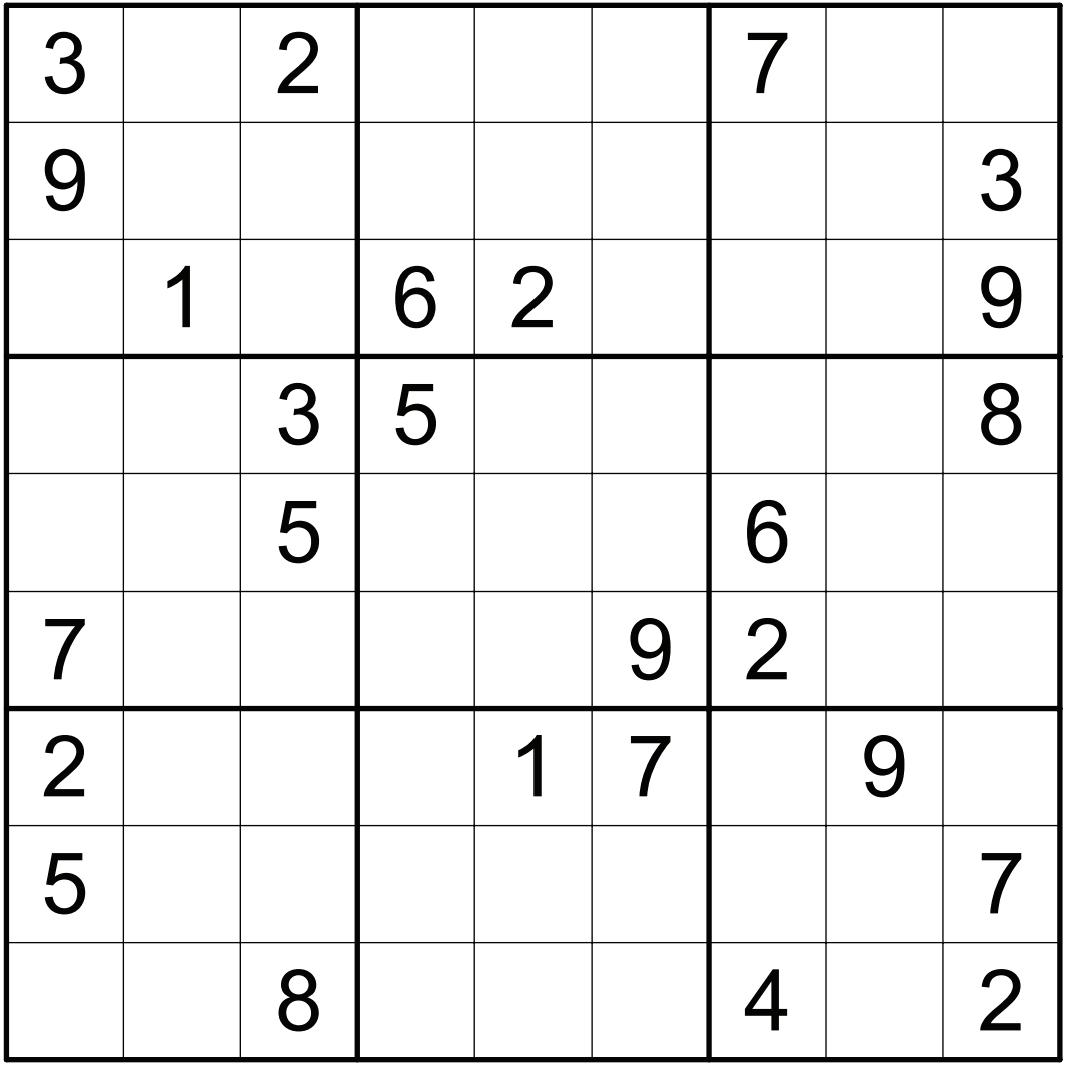
MAY 30, 2023 TUESDAY | GAMES | 15 COURTESY KRAZYDAD.COM COURTESY KRAZYDAD.COM SUDOKU WORD
BOOKSTORE SRC NITOBE HEBB CEME WOODWARD LONGHOUSE KOERNER LIFE IKB COURTESY THEWORDSEARCH.COM
SEARCH
COURTESY BESTCROSSWORDS.COM

CROSSWORD PUZZLE
1. Academy award
Ferber novel
abroad
1.
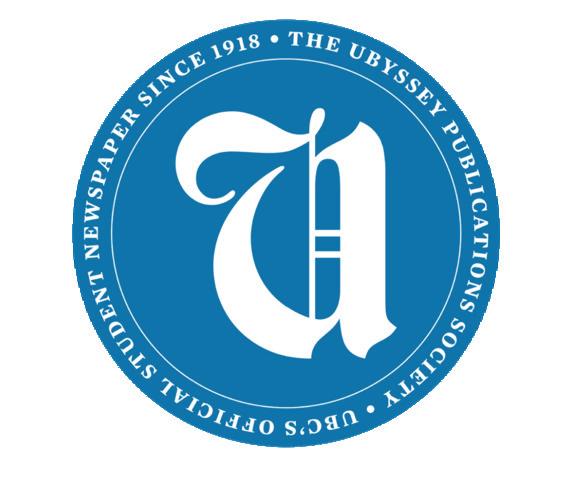
CROSSWORD PUZZLE
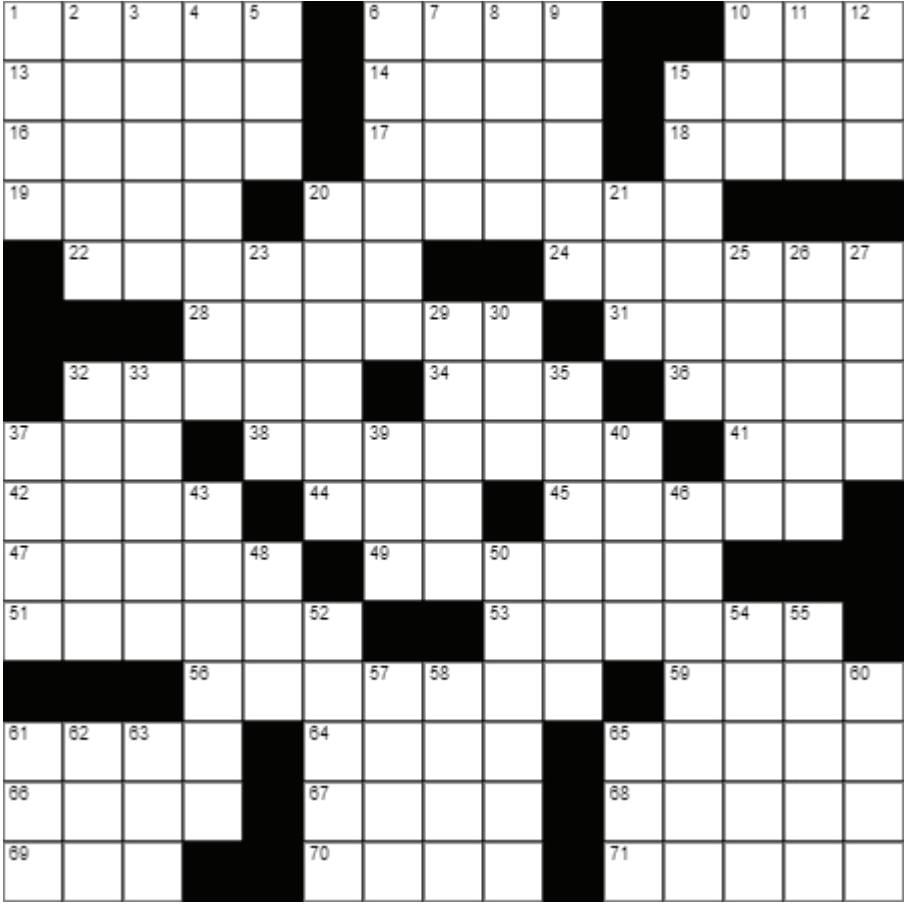
MAY 30, 2023 TUESDAY | GAMES | 16
French beans?
6.
11. Year
14. Strike ___ 15. Addis ___ 16. High hit 17. Deadly 18. Emblem 19. Hot time in Paris 20. So far 22. Small pulpy fruit 24. Asailor 28. Makes rhapsodic 29. More sore 30.
of
May ___ excused?
Bet 11. Argus-eyed 12.
Dame
Follows
Cutty ___ 23. Convenience
Lout 2. Mineral spring 3. Portable bed 4. Simile center 5. Narrate 6. Lustful deity 7. Clarinet cousin 8. Inner layer
a quilt 9.
10.
___
13.
orders 21.
Eve
female sheep 39.
poser 40. Knucklehead 41. Damon of “Good Will Hunting” 42. Grazing sites 43. Late bloomer 45. Repeat 46. Boiling 48. Arabian Sea vessel 24. Mud hut 25. Without ___ in theworld 26. Porcelain
27. Study of body movements 28. JFK posting 30. Sensation
by buds on the tongue
34. Oven
to
hops 36. An
37. Early anesthetic 38. Put away 43. Battery size 44. Hwys. 50. Latin American dance 53. Bring back 54. In sorry shape 55. Bikini blast 57. Summer mo. 58. Palpitate 60. Needing nourishment 65. Vane dir. 66. German poet Heinrich 67. Sheer fabric 68. RPM part 69. Red Bordeaux 70. Incite 47. Beat 49. Sagacious 50. Fastener 51. Residence 52. Boring tool 53. Renaissance fiddle 55. Dry and waterless 56. Up ___ good 59. Teefollower 61. Seasonal beverage 62. Cookie fruit 63. “Hold On Tight” band 64. Thieves’ place
32. First son of Adam and
33. Eucalyptus eater 35. More than one
“Rule Britannia” com
tableware
provided
31. Additional
used
dry
eccentric person
ACROSS DOWN COURTESY BESTCROSSWORDS.COM 1. Mum’s mate 6. Tense 10. ___ in Charlie 13. Overhead 14. Desire 15. Hide 16. Garfield’s middle name 17. Germinated grain used in brewing 18. Consecrated 19. Darn it! 20. Doubt 22. Large beer mug 24. Farm storage 1. Carson’s predecessor 2. Coptic bishops 3. Rich cake 4. Elusive 5. Dreamer’s acronym 6. Uproar
Member of a largely Middle Eastern people 8. Wrinkly fruit 9. French beans? 10. Corp. bigwig 11. Nothing but 12. Porker’s place 15. Tissue.thin layers of
Sacristy 31. Birch family member 32. Betel palm 34. Poet’s dusk 36. Concert halls 37. In the past 38. Long journey 41. CIA forerunner 42. Canceled 44. Comic Philips 45. Doppelganger 47. Rome’s Fontana di ___ 49. Rouse 51. Sixth planet pastry 20.Marquis ___ 21. Acapulco aunt 23. Art ___ 25. Extra 26. Ninnies 27. Important times 29. Plant again 30. You bet! 32. Greek marketplace 33. Thesaurus name 35. Osculated in the Olds 37. Hill dwellers 39. Vocalist Sumac 40. Primordial substance 53. Fermented soybean cake 56. Large spotted cat 59. Inter ___ 61. Shaft 64. The ___ Love 65. Goes into business 66. Just manages, with “out” 67. Hokkaido native 68. Tears 69. Mens ___ (criminal intent) 70. Small drink 71. Draw off liquid gradually 43. Undeveloped seeds 46. Theoretically 48. Dudgeon 50. Skylighted lobby 52. Bedouin 54. Actress Verdugo 55. Official language of India 57.Brace 58. Old Indian coin 60. Org. 61. ___ Lingus 62. Jaguar model 63. Pasture used for grazing 65. Old California fort
7.
28.
ACROSS DOWN Send game ideas or comics to visuals@ubyssey.ca.






 Anabella McElroy Coordinating Editor
Anabella McElroy Coordinating Editor










 WORDS BY NATHAN BAWAAN
DESIGN BY ANYA ANBER AMEEN
WORDS BY NATHAN BAWAAN
DESIGN BY ANYA ANBER AMEEN

 Iman Janmohamed
Features Editor
Iman Janmohamed
Features Editor








 Tori Fitzpatrick
Tori Fitzpatrick














